#verb definition for class 6
Explore tagged Tumblr posts
Text
3000 Verb in Hindi | Kriya in English Grammar
3000 Verb in Hindi | Kriya in English Grammar Definition of Verb: A word that shows an action, state or an event is called a verb. जिस शब्द से किसी क्रिया, अवस्था या घटना का बोध हो, उसे क्रिया कहते हैं। Types of Verb Main Verb Heling Verb Transitive Verb Intrasitive Verb Primary Auxiliary Model Auxiliary 3000 Verb in Hindi Kriya in English Grammar List of Verb in Hindi and English Sr…

View On WordPress
#50 verbs in english#English grammar#forms of verb 1st 2nd and 3rd#irregular verbs english#list of common verbs#List of Verb in hindi#regular verb list#spoken English#three forms of verb chart#types of verb#verb#verb definition for class 6#verb forms List With Hindi Meaning#verb list#verb list in hindi#verbs forms list#verbs list#what is a verb for kids
0 notes
Text
Sukuna's Backstory Theory (+ mini Uraume Backstory Theory)
While we wait for jjk ch 265 leaks, I hope you enjoy reading this post of mine in the meantime.
Please note that this is just my theory. Also, Sukuna deserves to die.
Now enjoy your reading.
WARNING: MANGA SPOILERS UP TO CH 264; subject covers the following sensitive topics: sacred s*x, cannibalism, homosexual relationships; mentions or implications of abuse

Beginning:
We know from Sukuna himself in chapter 237 that he was an 忌み子 - a taboo child. In ancient and medieval Japan, a taboo child is a child that is ostracized, unwanted, and discarded.

JJK CHAPTER 237
As mentioned by Sukuna, he himself 'consumed' his twin to survive and had presumed that his 'foolish mother' (愚母 - he wasn't looking down on her, calling her stupid, but instead he was humbly referring to her) must have been starving.

JJK CHAPTER 257
Prominent families during that time were the Fujiwara, Sugawara and Abe clans. For sure, he wasn't born a noble, but rather a commoner, or worst, a slave. He must've been born with weak or below average CE, too, aside from his four arms, four eyes, and the second face.
It was probably only him and his mother in the beginning and she was the only one taking care of him. Given their supposed circumstances, Sukuna must've started working by the time he was around 5 or 6. Plus, if I were to guess where they would've lived, it would be in the agricultural lands of a Buddhist-Shinto temple. In Heian era, Buddhism and Shinto co-existed together (shinbutsu-shuugoo) so it's not strange to find Buddhist temples to have at least one small shrine dedicated to a kami (a Shinto god/goddess) [these are calles jisha (寺社)] and Shinto shrines accompanied by Buddhist temples in mixed complexes [these are called jinguuji (神宮寺)].
In addition, these institutions had these manorial estates called, shooen (荘園), which were "any of the private, tax free, often autonomous estates or manors...... developed from land tracts assigned to officially sanctioned Shintō shrines or Buddhist temples or granted by the emperor as gifts to the Imperial family, friends, or officials." In the case of shrines and temples with shrines in them, they are called mikuri (御厨), which means a god's/goddess' kitchen.
The Chinese characters for mikuri are the same as the first two letters of Sukuna's CT (御厨子). In the beginning, mikuri only referred to the place where shrine offerings/sacred food (fish, vegetables, etc.) were cooked, but it eventually also included the land or property where they get the offerings from and prepare them in the meaning. Plus, the citizens of these lands/properties were called "gods' & goddesses' people" (神人, shinjin), and these mostly consisted of the producers (fishermen, farmers, etc.). We can definitely infer that Sukuna has most likely worked in the cooking area of the mikuri, the 御厨子所 (mizushidokoro, a kitchen for the upper classes and the shrines and temples) Think about it, not only does he use words related to consuming, but he also referenced fish-related words.

JJK CH 224 - "A fish who merely has no name attached to it."
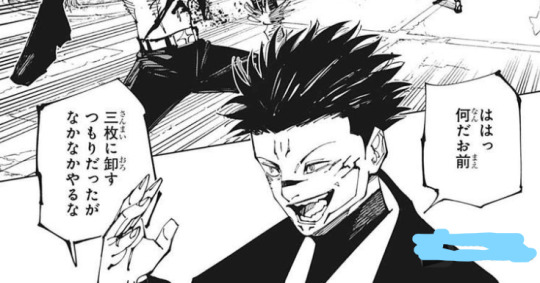
JJK CH 216 - "卸す" - to grate (e.g. vegetables); to cut up fish "三枚に卸す” - to cut you into three slices (fillet)

JJK CHAPTER 8 - "おろした" - past tense verb of 卸す "三枚におろした” - cut you into three slices (fillet)
(light blue is just to cover watermarks)
In Heian era, meat was forbidden except for some parts in Japan where hunting was really common (except for aristocrats and monks lowkey - they do eat them at times, especially when they fall sick). Fish was temporarily banned but was eventually lifted. So, majority of the Japanese people during this time period didn't eat meat with the exception of fish and other seafood. Moreover, when cooking the shrine offerings, the only meat they cooked was seafood. Plus, if he and his mom was in one of the shrine and temples in Heian-kyoo (present-day Kyoto), then chances are he had to cook for festivities and rituals in the imperial palace.
But then, how did he learn to read and write? The only one who were literate were the imperial family, aristocrats, Shinto priests, Buddhist monks, and anyone else related to religious institutions and higher rank than commoners. So the only available ways for him to have access to learning kanji (漢字 - Sino-Japanese characters) and even kana (hiragana and katakana) was to become an apprentice monk or priest. But I believe he became a Buddhist apprentice monk since it is more open than becoming a Shinto priest.
If he had started as a worker in the mikuri, he would have been secretly listening to the lessons between an apprentice and the older monk. Then, if he managed to prove his talent, he could have become an apprentice. If he were an apprentice monk, he would have to learn directly from an older monk. This would not stop him from working as a kitchen worker since he would have to help with preparing offerings and cooking for important occasions and guests.
As an apprentice, he would have learned everything about Buddhism, including how to preach to people. Unfortunately, there was a cost to this. It was the nanshuudou, the homosexual practice between a prepubescent apprentice monk and an older adult monk, which is heavily documented in Edo period but a practice that has been ongoing in the Shinto priest apprenticeships and eventually in Buddhist monk apprenticeship, as well. Mind you, this is not a practice between male lovers, but of loyalty and the first step to 'reaching enlightenment'. I think of it as a pseudo-sacred s*xual relationship. It is something expected at that time, but it may not have been a great experience for Sukuna. He was a taboo child, meaning even those older monks most likely made this harsher than it already was. Not to mention, he might have been as young as 7 or 8 years old when this all happened.
This was also sort of thought of by a JP theorist, according to this twitter user.
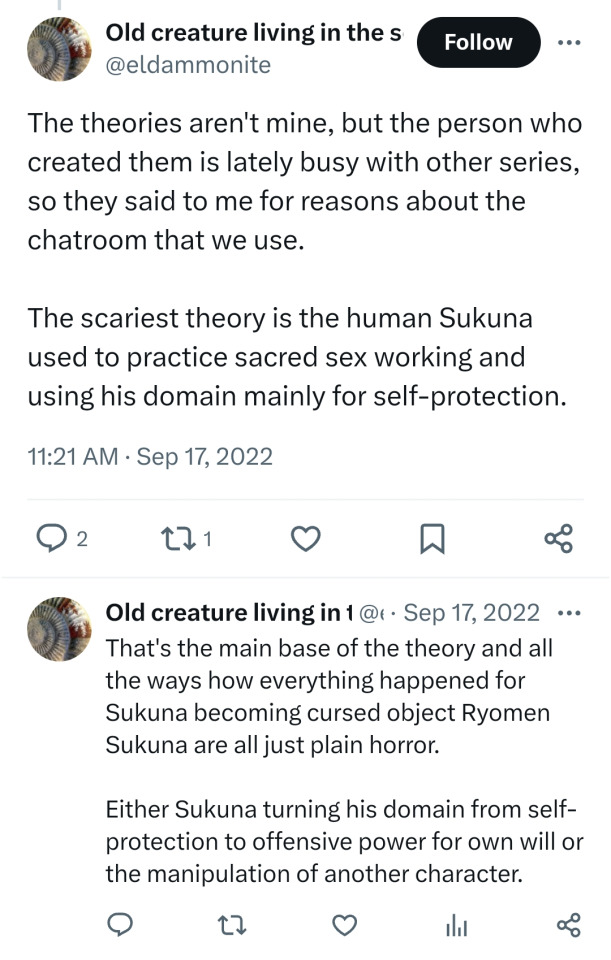
Anyways, let's move on from this sensitive topic.
You might be wondering why do I think he had been an apprentice monk and a cook? Well, mizushi (御厨子) also has these meanings.
Zushi (厨子) originally was a word for storage boxes for utensils and ingredients in the kitchen, then extended into becoming a storage for personal stuff and a decoration as well for aristocrats.
Zushi also extended to becoming a storage for Buddhism relics, scrolls or anything important. This includes the Buddhist altars. Thus becoming Mizushi, sacred storage.
Additionally, as an apprentice monk, he would be able to interact with nobility more. Buddhism was intertwined with the court politics in Heian era. This is more prominent when court officials and even the imperial family members, including the Emperor, would retire as Buddhist nuns or monks. Plus, there would also be visits by the officials and probably he was able to see or receive letters and poems from them. It would be inevitable that he learns them to communicate effectively.
This would also makes sense as he knew Tengen, who was an avid supporter of Buddhism.
Career as a Sorcerer:
In an era where the Fujiwara clan ruled supreme, leaving barely any crumbs for other aristocratic clans to take spots in the political arena. So, in order to consolidate their own power, many other clans (including the minor/weak branch families of the Fujiwaras) and Imperial princes went to obtain their own land outside of Heian-kyoo (present-day Kyoto) and even their own army. That's why these clans have armies of their own, especially those full of sorcerers. I won't be surprised if they took in anyone who has curse energy and trained them, just like what the Fujiwaras did with Uro.
So, I believe that someone noticed his cursed energy and his potential, then took him for training. Then obviously he would have met other Heian-era sorcerers. Here are my two cents on this:
I would like to believe that Tengen trained him as she was also an avid supporter of the religion, and he eventually met Kenjaku as they're 'friends' with her. Being a jujutsu sorcerer apprentice meant quitting or being part-time in his apprenticeship from the Buddhist Temple. (But I wonder if this would have stopped the pseudo-sacred s*x stuff.......) However, I'm open to the fact that it might have been another sorcerer who trained him (or there has been another one besides Tengen and Kenjaku who did so or influenced him) due to the name of his extension technique 'Divine Flames, Open'
One of the opposing factions (either the Sugawara, Tachibana or Abe clan) to the Fujiwara hired him in their order to put them in check. I'm leaning more towards the Sugawara clan.
This was probably the time when he probably met Angel from Abe clan, Uro from the Fujiwara, and especially Uraume. I'll explain how Uraume is related to the Sugawaras in a bit.
Sukuna served as part of Sugawara's troops or something like that. This can also be the point where he learned more about Japanese art and culture at the time.
One of the curses he must've fought was Yamata no Orochi.
Sukuna betrayed the Sugawaras and destroyed its army of sorcerers, with a few survivors left. Uraume decided to dedicate their whole life to him and followed him from then on.
He officially became a curse user and wrecked havoc in Japan, especially Heian-kyoo
Angel got enraged from his acts and with the permission of the Abe clan and the remnants of Sugawara clan, they jumped on Sukuna but lost.
Later on, he defeated the Fujiwara army led by Uro.
How is Uraume related to the Sugawaras?
There's this video from JP channel that was theorizing about Uraume when they first appeared in Shibuya arc a couple years ago that they used to be trapped in the prison realm before being freed so that Kenjaku can use it for Gojo Satoru and it was time for Sukuna's resurrection but this was obviously debunked, but there was something interesting that the creator brought up - the Tobiume.
Have you heard about The Legend of the Flying Plum (飛梅伝説)? So basically, when Sugawara no Michizane was demoted in ranking because of the Fujiwaras and was exiled, he wrote a poem expressing his sorrow of not seeing his precious plum tree in his residence in Heian-kyo (present-day Kyoto) ever again. Then from this, a romantic legend came about, where the plum tree was so fond of its master and cannot bear to be apart from him that it finally flew to Dazaifu, where he was exiled to, and that tree became known as tobi-ume (飛梅, 'the flying plum').
Michizane loves plum trees and plum blossoms, so it won't be strange if there were people in the clan named after plum blossoms or plum. In my case, I believe that Uraume is related to the Sugawara clan, but their status in the clan itself wasn't great. We can assume from their name in kanji, 裏梅.
裏 means the following:
opposite side; bottom; other side; side hidden from view; undersurface; reverse side
rear; back; behind
in the shadows; behind the scenes; offstage; behind (someone's) back
梅 means plum
Though they may have been born from a noble, prestigious clan, they remained in the shadows. My theory is that, for whatever reason it may be, Uraume's life wasn't as good as before Sukuna allowed them to serve him. They might have been an illegitimate child or they might have some deformity we don't know of, or whatever. Then they met Sukuna and the rest was history.
Do you not believe that Uraume is not related to the Sugawaras?
Let me show you a picture of the Sugawara clan crest.

They call this umebachi. A plum blossom crest.
And what's in Uraume's name? Ume (梅) - plum.
Another thing here that fulfill its name is the fact that Uraume is Sukuna's servant. Just like the tobiume, they follow their master from behind and cannot bear to be apart from him.
'Divine Flames, Open':
Here's something that caught my attention.
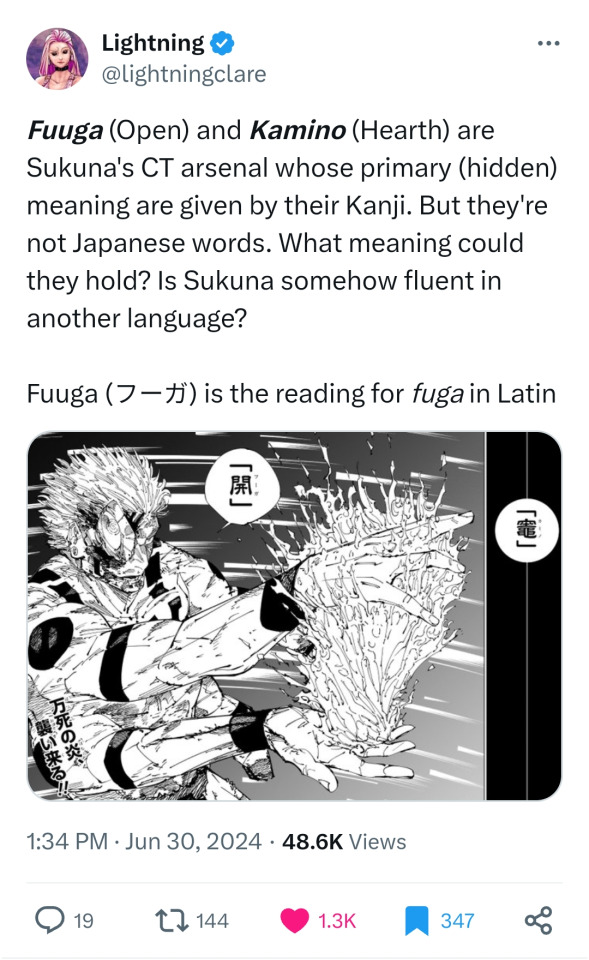
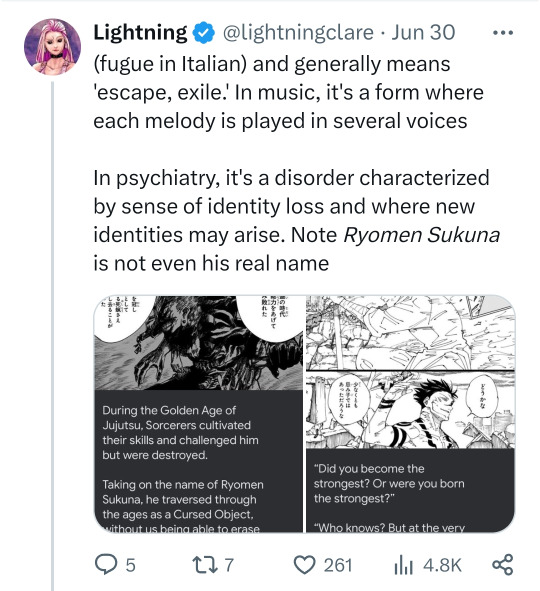
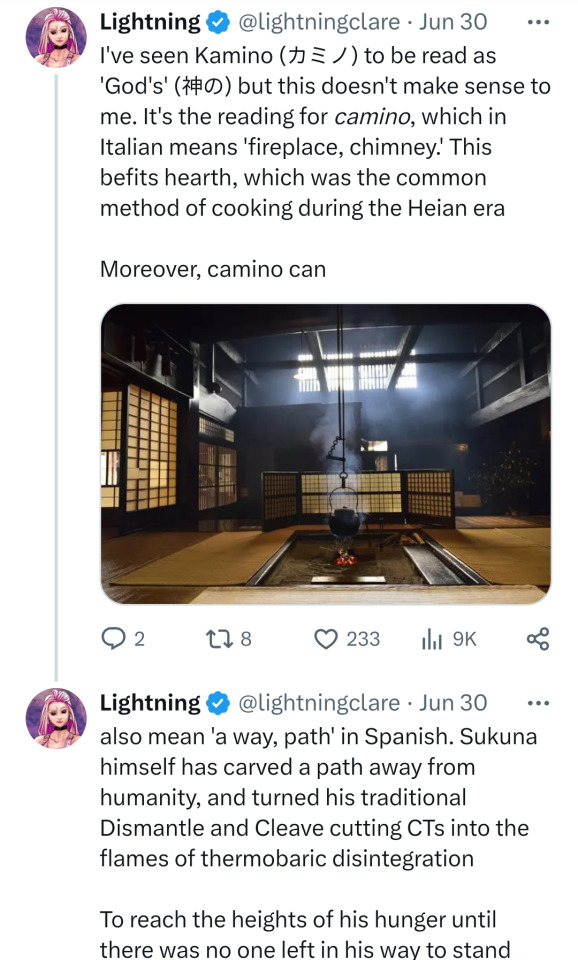
Kamino (カミノ) has the kanji 竈, that is originally pronounced as kamado. It means traditional Japanese wood or charcoal-fueled cook stove. Fuuga (フーガ) has the kanji 開, originally pronounced as kai, meaning open. Now everything else is purely Japanese except these two.
Kamino and fuuga originated from Latin and Ancient Greek, and both exist in the Romance languages. How tf is he using these words? Around Heian era, only the Eastern Roman Empire is standing and the main language there was Greek....... but that's around present-day Turkey and its surroundings. The furthest they reached in trade was China...... oh wait, Heian era Japan still traded with China........
Seems like that theory of Chinese sorcerer isn't far-fetched, eh?
(But fr tho, do you think he met someone from Byzantine? There's no confirmation time travel is a thing so that's the only possible explanation)
Cannibalism:
Cannibalism, believe it or not, was practiced in China from Tang Dynasty and onwards. Remarkably, Heian era's last major Chinese contact was with Tang Dynasty. Records of cannibalism must have been brought from Tang Dynasty China along with Buddhism and other things by monks who were sent to China by the government.
It was said that human flesh of a young person was a great medical treatment for illnesses. So there would be young people, especially females, sacrificing some of their flesh for the sake of their parents or parent-in-laws recovery. Furthermore, Emperors, e.g. Wuzong of Tang, supposedly ordered provincial officials to send them "the hearts and livers of fifteen-year-old boys and girls" when they had become seriously ill, hoping in vain this medicine would cure him. Later on, private individuals sometimes followed their example, paying soldiers who kidnapped preteen children for their kitchen.
There was also something called war cannibalism, in which victors in a battle, war, or conflict would eat the dead enemy's flesh as "official punishments and private vengeance", as well as "celebrating victory over them."
Therefore, I propose that Sukuna started cannibalism as a way to treat an illness or disease - in private obviously since in Heian era, meat other than seafood was banned and meat that becomes available for special occassions or circumstances like falling sick are reserved for the upper class, plus if he ever was an apprentice monk, he would not have been allowed to consume meat. Since Heian era had outbreaks, such as smallpox, and also common diseases, anyone can get it, including him. So, not wanting to die, he resorted to this. But then it eventually became a habit that also extended to eating people he defeated in battles and young people and women for medicinal and nutritional purposes later on. This is the most likely the reason why in the first chapter, he was looking for children and women.
But if he had contracted some sort of illness or disease at some point in his youth and cannibalism (obviously) wasn't a cure for it, how would he have survived it and lived longer? Perhaps it might have to do with Tengen - who knows if she could have an extension technique of her Immortality CE, where she could have extended his lifespan. It could have had to do with Kenjaku; with their vast knowledge, it's possible he offered a solution to him. However, I'm leaning more towards Tengen helping him in this regard. It was also probably the reason why she ended up having four eyes and all because of this. But, of course, he couldn't escape death, so he agreed to Kenjaku's terms and became cursed objects to reincarnate later on.
My second proposition is that Sukuna was maltreated and the people didn't bother sharing meager amount of food available to him. We know that because of the Fujiwara family's political monopoly in the capital as well as the distribution of the land to nobility made it possible for them to abuse their power. For instance, these lords imposed taxes in an unreasonable amount to fund their lavish lifestyle, which obviously made life hard for the peasants and slaves since goods such as silk, grains and food became a common medium of exchange when the currency fell. So you can imagine how much they had to give up just to pay their taxes. This definitely made their food supply low. I can also imagine Sukuna was blamed for misfortunes and misery they have experienced because of his status as a taboo child. I don't think they would provide him food and so he would have to rely on dead people to survive.
And assuming that we're going off with this proposition instead of the other one, I think the reason why Sukuna was seeking women and children because in the past, it was more common for children and women to die. Children are naturally more vulnerable and women die easily, especially during childbirth. I'm certain that the most common corpses or bodies he must've found were those of children and women. But, of course, eventually he began to crave humans because he got so used to it that normal food didn't satisfy his hunger any longer - not that cannibalism fully resolved it, though.
The Fallen:
(I'm not gonna lie, majority of what I would say here are more assumptions based on Geto's and a bit of Yuji's acts)
Everyone has been comparing Sukuna and Gojo, seeing them as foils and parallels. I acknowledge that they are similar to each other and whatnot. But what if I tell you that he could've gone through an experience or two similar to Geto?
Think about it. Wouldn't you consider Geto as a 'Fallen One'? He was a righteous man, whose goal is to protect the weak as a strong person. But after the Toji incident, his moral convictions and purpose has been questioned by himself, and eventually, he fell from grace - being stripped of his status as a jujutsu sorcerer and thus becoming a curse user. He had the same values but they were reinterpreted and twisted.
If my theory on Sukuna being educated at a Buddhist Temple is true, then he must have believed in the salvation of those who are suffering (like Yuji to some extent), but was corrupted along the way. He had the same ideals, but it became reinterpreted and twisted. I think the reason why he hates Yuji because he is seeing all those he threw away to gain freedom and absolute strength in jujutsu in him. Both of them are inverses of each other, and it's not a surprise if Yuji is the representation of the old Sukuna.
I mean if you look at nobility back in Heian era, they kept indulging themselves in leisure and pleasure to the point that they neglected the economy. Literally the currency fell and all those bureaucratic and admin work fell mostly to lower classes working in each ministry. Basically back then, the higher you were in the hierarchy, the more pleasure you could attain and keep chasing for. How else did you think Japanese art, literature and culture came to be during this era? This was where he probably learned about hedonism or what influenced him to be one.
Not to mention, people who would've taken advantage of him for their pleasure, curiosity, greed and personal gains, power and control, and many more reasons. He could have been like Geto and Yuji, who exorcise curses and help the weak. There was a turning point where he decided to let go of everything and walk the path that he has been in for the last 1000 years.
I am not surprised if he decided to be who he is today as a revenge to the world, a response to the trauma and suffering he went through just like Geto.
If I am right about Sukuna going through a similar experience as Geto did, then this page below brings a whole new meaning to the Gojo vs Sukuna fight on December 24, 2018 - the death anniversary of Geto:

JJK CH 223
But despite all of these, there's one thing we can agree on - that is, he became the monster the world sees him as in the end.

That will be it. I hope y'all like it to some extent. Until then.

References:
Heian Era, Buddhism, 御厨子 -related Topics:
https://en.m.wikipedia.org/wiki/Sh%C5%8Den/
https://ja.m.wikipedia.org/wiki/%E5%BE%A1%E5%8E%A8
https://en.m.wikipedia.org/wiki/Buddhist_temples_in_Japan
https://www.britannica.com/place/Japan/The-Heian-period-794-1185
https://www.colorado.edu/ptea-curriculum/imaging-japanese-history-1
https://ja.m.wikipedia.org/wiki/%E5%8E%A8%E5%AD%90
https://en.m.wikipedia.org/wiki/Sugawara_no_Michizane
https://en.m.wikipedia.org/wiki/Heian_period
https://www.colorado.edu/ptea-curriculum/imaging-japanese-history-1
Homosexuality in Medieval Japan:
https://www.tofugu.com/japan/gay-samurai/
https://ida.mtholyoke.edu/items/19c86409-c129-46a1-927b-11cfe0ffb1c3
Cannibalism & Sacred S*x-related Topics:
https://en.m.wikipedia.org/wiki/Human_cannibalism
https://en.m.wikipedia.org/w/index.php?title=Medical_cannibalism&diffonly=true
https://en.m.wikipedia.org/wiki/Cannibalism_in_Asia
https://en.m.wikipedia.org/wiki/Sexual_ritual
https://en.m.wikipedia.org/wiki/Sacred_prostitution
Ancient Greek, Latin, & Roman Empire Topics:
https://en.m.wiktionary.org/wiki/fuga
https://en.m.wiktionary.org/wiki/caminus
https://en.m.wiktionary.org/wiki/camino
https://en.m.wikipedia.org/wiki/Sino-Roman_relations
YouTube Videos I Referenced:
https://youtu.be/5n24Ulc8u84?si=Nngbg4xEqyNu82x8
https://youtu.be/WhBN29CIuAQ?si=5bNryoT-GzleIGq9
Reddit Posts I Referenced:
https://www.reddit.com/r/Jujutsushi/comments/1bngk9x/i_solved_one_of_the_great_mysteries_of_the_heian/
https://www.reddit.com/r/AskHistorians/comments/ztay5e/what_foreign_countries_did_japan_have_trade/
https://www.reddit.com/r/AskHistorians/comments/zs4k9p/what_was_life_like_for_the_average_people_heian/
Twitter Posts I Referenced:
https://x.com/eldammonite/status/1571157320570380295
https://x.com/lightningclare/status/1807467771913269374
#jjk#jjk manga#jjk meta#jjk sukuna#sukuna#ryomen sukuna#sukuna ryomen#uraume#jjk uraume#jujutsu kaisen manga#jujutsu kaisen#jujutsu geto#jjk geto#gojo satoru#geto suguru#jjk spoilers#jujutsu sukuna#jjk 265
167 notes
·
View notes
Text
One of Your Kind (CH. 2)
Ch. 1 | Ch. 2 | Ch. 3 | Ch. 4 | Ch. 5 | Ch. 6 | Ch. 7 | Ch. 8 | Ch. 9 | Ch. 10
Word count: 2.5K
Summary: finally you’re making some friends and even learning English better, finally gaining more confidence and security in yourself.
Warnings: none really
Pairing: Jenna Ortega X Fem!Reader
———
To say you wanted to make friends was an understandment. That day as you talked to Jenna for the first time, you couldn’t be happier. Finally you had found someone who was willing to talk to you and that wasn’t your boss. “It’s nice to finally talk to you, (Y/N)” the girl said, holding her hand out for you to take. “same” you said and shook her hand, smiling at the girl in front of you. She seemed very friendly and as you fixed the equipment on her she would try to make small talks to get to know you and Megan from afar couldn’t help but be happier that you were finally making friends. “So, you’re from Italy, right?” Jenna said, speaking ever so slowly to make you understand every word. “Yes” you said and she looked at you. “Must be nice…” you chuckled and shook your head “not during covid. I’m here for work because otherwise I can’t leave my country.” It took Jenna a while to understand what you were saying, because your sentence really didn’t make any sense.
“What?” Jenna asked, tilting her head in confusion, before a light bulb turned on in her head. “Wait- ooooh! You mean you only travelled because of work? Aside of work you can’t leave Italy. Is this it?” You nodded awkwardly and looked down, ashamed of yourself. “I’m sorry. My english is bad” you said again, avoiding to look at her. “Nooo it’s okay! You have time to learn. You could take English classes!” She said and this time a light bulb turned on in your head. You had never thought about taking english classes, and it was a valid option, you definitely could think of it, but on the other hand, you didn’t know anyone who gave English classes. “I can, but I don’t have time.” Jenna snorted “oh come on! I’m sure that if you talk to Megan she’ll give you some days off for the lessons!”
And that turned into reality, because from the following week you had two days off to have online English classes. It was extremely hard for you, the teacher unluckily didn’t know Italian (which you had hoped, so it would be easier, but nope) and even if he did know it, he wouldn’t have spoken it with you because you had to practice hearing and speaking English, and the right way to do so was definitely not to speak Italian. You also needed to learn some grammar, so you had to write and do exercises, almost as if you were back in school, not that you were good at English there either, but you tried. You tried and you had too make it, if you wanted to continue staying in America.
Filming had just been wrapped up for the day and you were in your trailer, trying to do some exercises, though making them wrong. You grunted at each mistake you made. It was summer, so you were sitting outside with your notebook in hand, lots of writing mistakes and everything as you tried, you really tried to understand what you were writing or what you had to write. All these verb forms, from present simple to present continuous. What in the world was even the difference? After the thousand time of making the exercises wrong, you got really angry. “Fanculo!” [fuck it] you yelled and threw the notebook away from you, it ended in a mud pit. “Bene, cos’altro deve succedere? Come se tutto questo non fosse abbastanza” [great, now what else has to happen? As if all this wasn’t enough] you yelled again, getting the attention of every other staff member who was walking around.
Between those staff, there were actors, too. And between them, was Jenna, the girl you only talked with once. As you went to pick your notebook up from the mud pit, she had assisted to your nervous break down and made her way over to you. “Hey, are you okay?” She asked and you looked at her, chuckling at yourself. “Do I look okay? I can’t do an exercise right” you said as you grabbed a tissue and tried wiping the mud off, you hadn’t even realized that for the first time since you started taking the lessons your english was good. Your pronunciation too and you surprisingly had an accent as well. Jenna noticed, but decided to say nothing about it. Looks like you had to get mad to speak good english. You sat back down on the stairs of your trailer, and Jenna sat down next to you. “What kind of exercises?” She asked, taking a peak at your notebook.
“Uhm- verb exercises. I have to write italian phrases in english using present simple or present continues or whatever that is. And I don’t know how to even use that.” You gave Jenna your notebook and she tried to take a look, through the mud. “Is that what they teach you?” She asked, she looked confused but you nodded “yeah. In Italian school they do the same” she nodded and handed you the notebook. “I think that grammar rules are stupid. Why don’t you try practicing with talking? You don’t necessarily have to know the rules… I think it’ll just come out naturally you know? You’ll get used to it. Try asking your teacher.” She smiled at you and you nodded as a reply. It was really good that you finally had a friend. “And you could start with talking with me about anything!” You immediately looked up at her with a hopeful look on your face and hopeful eyes.
“You want to do that for me?” You asked, this time having an accent as well. “Yes of course! Come on, what do you want to talk about?” Jenna was really eager to talk with you and improve your language. “Wait- right now? Don’t you want to go to bed?” You asked and looked at her, she shook her head and smiled. “I’ve had like three coffees, I don’t want to go to bed. So, what do you want your job to be?” She asked, and you swallowed, taking your sweet time “I uh- I’m go to be a movie director” you said, and Jenna smiled “ok so in this case, you want to use the -ing form because it’s something you haven’t done yet and that you want to do. Try again” you listened attentively and nodded “see I told you I suck at this.” You said and sighed “don’t give up! You can do it” she waited for you to speak. You sighed again. “I’m go…ing? I’m going to be a movie director” “yes! Yes that’s good! Come on let’s talk some more”
That’s how you spent the entire night talking to Jenna about anything at all, you realized that she was a very friendly girl, goofy and funny, never wasted an opportunity to make a joke and make you laugh. She was like this with everyone, she simply didn’t like seeing girls her age being all on their own, but somehow she felt a connection with you. The two of you hadn’t even realized that the sun was rising, until Jenna yawned. “Wait, what time is it?” You looked at the time and your eyes widened “you start filming in an hour” she looked at you “what?” Jenna exclaimed looking at her watch “crap, I need to go. I’m sorry!” She said as she ran away to the make up booth. You smiled and shook your head, going to Megan for today’s work.
You walked to the set and made your way over to Megan, yawning and rubbing your eyes. “Good morning. Up studying late?” She asked and you nodded. “Yes. I was try to…” then you remembered what Jenna told you the night before “I was trying to do some exercises but I always failed, and Jenna came along. She helped me with talking and she helped me use the verbs better. We didn’t realize when it got morning so here I am” at that, Megan passed you her coffee with a small smile, you took it and immediately chugged it down. “So you two are friends?” She asked, you nodded as you swallowed a sip of coffee. “That’s amazing! I knew you two would get along!” She said happily and you smiled again “yes. She’s very nice to be around” you said and went to work.
Today you had an important job. There was a scene where Vada and Mia, both high and drunk had to dance and sing and act goofy in a parking lot, and Megan let you decide how it had to be shot but you had to tell everyone, and act like an actual director. She told you to be bold if anyone acted up and didn’t want to listen to you. Obviously you talked with Megan about what worked and what not, and after deciding everything together you had to tell everyone how it worked. “Okay, this is how it is going to work. As Jenna and Maddie are following their script, you have to walk around them with the cameras, making it seem kind of messy.” Is that clear?” They nodded and got to it, however it was not coming out how you needed it “CUT! Jenna, Mia, amazing as always, but guys, That’s not what I asked you to do.” You turned to the cameramen “I asked you to make it messy. the cameras are steady, how is that messy?”
They looked at you and chuckled “if you’re not satisfied with what we do then why don’t you do it yourself?” one of them said, seeming proud of himself. “Because I’m a director” you said, causing him to chuckle more. “You’re not an actual director.” He said and crossed his arms, his whole crew chuckling with him. “You’re right, I’m not.” This only caused him to feel prouder- “yet. But now I am a director and I’m YOUR director. My job is to direct you and yours, as a cameraman, is to hold a camera and hold it as I tell you. So do that.” The chuckle left his and everyone else’s face and both Megan and Jenna looked at you as if to say ‘jeez, this girl has some balls.’ And just like the other times, when you got mad your “best English” came out. “Yes boss.” He said and you were the one to chuckle this time, with satisfaction. “Get back to work!” This time, the scene was shot perfectly and Megan gave you a high five at the end of it. “GIRL THAT WAS AWESOME BACK THERE!” She said happily and smiled, talking a bit too fast, but this time you didn’t notice. Having that way too long conversation with Jenna definitely also helped you understand better, too. “They were idiots… and I put them in their place like you told me”
The more you continued filming with Megan, the more you learned and the more you became friends with Jenna, and even Maddie, surprisingly enough. You didn’t like her in the beginning, you thought she didn’t want to talk to you because of the language and because you didn’t understand her but truthfully, she’s just really shy and Jenna had to intervene to make the two of you start talking, but now you had one more person to talk with and you could improve your english! The three of you still spent nights in your trailer just speaking and while doing so they also corrected what you said or even your pronunciation. “So like one of my difficulties is the letter “r”, how do you not roll it- like where do you put your tongue” you asked them, and they tried to explain, but they didn’t know how. “You like have to put the back of your tongue on the roof of your mouth” you tried, but you would make really weird sound and at some point they were both laughing and crying on the floor.
“Stop it!” You said laughing as well as you threw a pillow towards Jenna, you laughed so hard that your stomach started hurting. That night was probably the best one you had on set there and it was a core memory. At some point, even Megan joined those nights.
Eventually though, you wrapped up filming. Which meant that your experience as a director in America was over and you had to go back to Italy as the last scene was shot, a round of applause was given to Megan and to the actresses, as you gave Jenna a thumbs up while Megan started speaking “Thank you guys so much. This was my first ever movie as a director and I couldn’t ask for a better cast and better staff, you guys were all amazing” you, who still stood alone and aside, also applauded to her. “I would also like to thank (Y/N)… she’s just a student but she has talent. She can be a great director and who knows, maybe even an actress some day! I took the opposite route but it was still worth it. You did a really good job, I’m really proud of you” Megan said and came towards you, hugging you tightly. You did the same and thanked her, as best as you could.
“(Y/N), if you stay in America I can guarantee you an apartment in LA, where you can continue and finish your studies. You’re really talented and I see a huge future for you, are you willing to move here?” She asked, and of course you didn’t waste the opportunity. After having cleared set, you went to say your goodbyes. You still had to catch a plane, from Ohio to LA. You went to Jenna last, you wanted to say a proper goodbye to the girl who helped you struggle less here. She helped you learn the language and even though you still sucked at it, it was definitely better than wen you first came to America. “Jenna wait!” You ran after her, catching her before she could get in the car. “I just wanted to thank you, for everything” Jenna smiled at you as she pulled her hair up in a messy bun. She was wearing comfortably for the plane.
“You’re the first friend I made here, and you helped me struggle less with the language. I mean I still suck, but it’s better, right?” You giggled nervously. “Oh shut up! You’re the best friend I ever made on set! And your english has definitely improved. I can’t wait to see you become successful for your movies. I have to go now though. You’ll text me?” You nodded and hugged her again. “Yep, I’ll text you. Safe travel!” You smiled and watched her get in the car. Just as she left you remembered…
“Shit, I never asked her for her number.”
A/N: well that’s bad for our reader- I mean things couldn’t be so easy right? We gotta keep the slow burn >>>>
Tags: @idkjustliving2
#jenna ortega#jenna ortega x r#jenna ortega x y/n#jenna ortega x you#jenna ortega x reader#jenna ortega x fem!reader#vada cavell#tara carpenter#wednesday#wednesday x y/n#wednesday x you#wednesday x reader#wednesday adams#wednesday adams x reader#wednesday addams#wednesday addams x y/n#wednesday addams x you#wednesday addams x reader
389 notes
·
View notes
Text
15 people 15 questions
thanks to @simmyfrobby and @sergeifyodorov for the tags. my fandom mom and dad (affectionate)
sorry this got long (also sorry for that joke, joy and cody, I regretted it as soon as I typed it)
1. are you named after anyone? short answer, no. long answer, I'm named after a goddess, but it wasn't with the goddess in mind that I was named, it just sort of ended up that way. and I chose aleksandar because of the protagonist of a book.
2. when was the last time you cried? ok this one was funny. I was watching one of the tsn(?) promo vids they did for the pwhl. there was a girl, I don't even know who she is, but I had the most intense thought like "WHY AM I SO OBSESSED WITH HER" and I was TEARING UP!!!! so the tl;dr is that I am a lesbian and I like girls
3. do you have kids? no but I think about it a fair amount like... that's definitely not something that is possible for me but I love kids!!!
4. what sports have you played/do you play? as a kid I did a bit of soccer, ballet, contemporary dance and nothing really stuck... then in high school I discovered endurance running and it actually Changed My Life. then I got an injury before running my first 10k. which was a shame. and now I've not really picked it up again, but I do freestyle wrestling!! which is a TON OF FUN & I hope to keep at it for a long time
(I do still find soccer fun to this day I'm just terribly unskilled at it and sometimes get the urge to join 12 year olds playing it in the park)
5. do you use sarcasm? yes
6. what's the first thing you notice about people? if they look friendly. I don't know.
7. what's your eye colour? brown AF
8. scary movies or happy endings? and what if I want my horror movie to end well??
9. any talents? I can sing... I like drawing when I can set my mind to it. I don't write enough but I really like my writing style : )
10. where were you born? montréal, québec BABY!!!!
11. what are your hobbies? doing nothing on the computer. listening to obscure music. making mashups. watching sports (obviously). PHYSICAL ACTIVITY!! language learning and uhh, reading and drawing on occasion
12. do you have any pets? four! dog. cat. two rats (chucky and freddy. I talk about them sometimes)
13. how tall are you? an unfortunate 5 feet and 3 inches tall
14. favourite subject in school? history or english. or french, honestly depends. english I didn't have to put any work in (ESL is deeply unserious (we were learning verb conjugations in TENTH GRADE!!!???)). history was fun when we talked about something I liked (war history. and also I liked the teacher). french I could also get away with not doing anything because I was the best student in the class. Um. math was fun honestly? did a bit of html & js in college before dropping out, loved it also,.
15. dream job? so re: question 3 & question 4. my dream job would be to coach kids at wrestling, honestly. I love teaching & I love kids but I won't be going back to school to become a teacher, but being able to teach a sport would be, I think, the most fun I could have in a job... as of right now my current job plan is to go become what is essentially a handyman. it pays and I would like doing it!
I won't tag 15 people but @one4theoverlypassionate, @nicohischier, @dacchamp, @pink-car, @nastybastian, @ineffag-swag, @glitchcel, @jimothystu... if you haven't done this! (and sorry if you have. I'm not as online as I used to be 😭)
6 notes
·
View notes
Text
STORYTELLING: SCRIPT TO SCREEN. GROUP WORK GENERATING SHORT STORY IDEAS.

For my February 2nd class for Storytelling, Script to Screen, I and some of my fellow students were split into groups of 3 or 4 to brainstorm potential animated short story ideas. First, choosing an object, a setting, and an action/verb to create a story idea. As an exercise to get our creative juices flowing for when we go to make our own animation pitches.
For this exercise, we used the website storydice.com, a website with virtual dice with symbols that serve as inspiration for story ideas. Using these dice, the group and I came up with a few ideas on the fly. Some of which include:
Rats steal cheese from rat traps to start a pizza restaurant - the rats put mouse traps in the pizza to kill humans and bake them into the pizza as revenge. - essentially, sweeny todd meets Pixar's Ratatouille.
A Pirate becomes best friends with a Kraken - the other pirates disapprove. The sea monster friends of the Kraken are mostly okay with it if a bit weirded out. Similar to how some people are weirded out by people owning spiders as pets - tell it in a moc-documentary style akin to ABC's The Office, with some pirate crewmates and sea monsters being interviewed. Even though it makes no sense with the period - it enhances the comedy.
We had fun creating various ideas for the second concept, the pirate and Kraken one. I even drew concept art in my notebook of some of Karaken's friends, with a 6 ft tall stick figure for scale.

This exercise was very enjoyable and helpful in understanding the process of developing story ideas. It was nice having others to bounce ideas off of and not have to overthink certain story concepts and have fun. I will definitely use the story dice site as a valuable tool to develop ideas for potential pitches.
2 notes
·
View notes
Text
Ma.Cristel Mercado
2nd Year
Methods of Teaching Grammar
1. Diagramming sentences
Diagramming sentences is visualizing how to fit together the dilferent parts of a sentence. The subject of a clause goes in one slot, the verb in another, and so on. Words that modify another word are attached to the word they modify.
It helps students understand how a sentence works by breaking it down to the component pieces. It is like a puzzle which is not solved until all the parts are in the right place, and none are left over However, there has been a shift in the practice of diagramming.
3. Inductive Teaching
The main goal of he inductive teaching method is the retention of grarmmar concepts, with teachers using techniques that aro known to work cognitively and make an impression on students' contextual memory.
Scenario: A 5th-grade science class is learning about ecosystems and the relationships between living organisms and their environments. Instead of starting with definitions and theories, the teacher uses an inductive teaching approach to guide students toward understanding the concept of ecosystems.
4. Deductive Teaching
This type of teaching has many people rethink such methods, as more post-secondary level students are revealing sub-par literacy skills in adulthood. Deductive teaching melhods drive many students away from writing because of the tediousness of rote learning and teacher-centered approach.
Present the General Rule:
The teacher explains that this theorem applies to right-angled triangles, where (a) and (b) are the lengths of the two legs, and (c) is the length of the hypotenuse.
The teacher begins the lesson by writing the Pythagorean theorem on the board:
5. Interactive Teaching
This method allows teachers to tailor their lessons to the different learning styles of students. For instance, each student can be given a large flashcard with a word on it and the students, themselves, must physically arrange these into a proper sentence. Other games can include word puzzles or fun online quizzes.
Ask students to think about what they have learned.
Encourage them to make connections by answering these questions:
"How does evaporation occur in our environment?"
"What happens to water when it rains?"
"How can we conserve water in our daily lives?"
6. Functional-notional approach
When designing a lesson, teachers often choose real-world situation as their "notion, and choose corresponding functions to teach to prepare students to communicate in that situation in the lesson.
A lesson might be about how to buy something at a shop, in which case its notion is shopping and one of its functions might be asking prices. Functions often lend themselves naturally to specific grammatical patterns or common expressions.
7. Situational contexts
Fromkín, Rodman and Hyams (2011) sald context can be lingulstic and situational. Linguistic content is about the information that was formally written or spoken and situatlonal context is the general knowledge that a person has of the worid.
Someone is giving a speech in front of their entire school. They might rush their words more than they would in front of just their close friends because they are nervous about public speaking.
8. Using texts, stories, songs, and rhymes
There are different ways of using songs in the classroom. The level of the students, the interests and the age of the leamers, the grammar point to be studied and the song itself have determinant roles on the procedure. Apart from them, it mainly doponds on the creativity of the teacher. At the primary level of singing the song, the prosodic features of the language is emphasized. At the higher levels, where the practice of grammar points is at the foreground songs can be used with several techniques.
1. Text:
Book Chosen: Brown Bear, Brown Bear, What Do You See? by Bill Martin Jr. and Eric Carle.
Activity: The librarian reads the story aloud, showing the colorful illustrations. After each page, she asks the children, “What do you see?” encouraging them to predict the next animal.
2. Story: Short Storytelling
Story Chosen: An original short story about a friendly rabbit who goes on an adventure to find his missing carrot.
Activity: The librarian tells the story interactively, asking the children to make rabbit sounds whenever the rabbit is mentioned. She incorporates actions they can mimic, such as hopping.
3. Song: Sing-Along
Song Chosen: "Five Little Ducks."
Activity: The librarian leads the children in a sing-along, using hand motions to depict the ducks going out and the mother duck calling. After singing, she discusses the concept of counting and numbers.
4. Rhyme:
Rhyme Chosen: “The Itsy Bitsy Spider.”
Activity: The librarian introduces the rhyme using finger movements to illustrate the spider climbing up the spout. She encourages the children to join in, reinforcing vocabulary and movement.
9. PPP
A deductive approach often fits into a lesson structure known as PPP (Presentation, Practice,Production). The teacher presents the target language and then gives students the opportunity to practice it through very controlled activities. Presentation involves building a situation that requiresa natural and logical use of a new language. It is in the presentation stage that students krnow what they will learn and why. Practice involves testing the procedure so students can be familiar with the language. In this stage, students will be provided with activities that can make them use the new language. The production stage, being the most important stage, students here shall have made the transition from "learners" to becoming the presentation to help student communicate meaning using the new language.
Presentation
Introduce the Past Simple tense.
Activity: Begin with a brief explanation of the Past Simple tense using examples. You might present sentences like:
"I visited my grandparents last weekend."
"She watched a movie yesterday."
Practice: Provide gap-fill exercises where students complete sentences with the correct past tense form of the verb.
Example: "Last summer, we ______ (go) to the beach."
Production: Ask students to write a short paragraph about what they did last holiday. Encourage them to use as many past tense verbs as possible.
Modes of Teaching Grammar
1. Linguistic Mode
Students must be familar about the use of structures so that they will understand. Larsen-Freeman (2002, 2014) maintained that students must knaw about the use of structures that they will understand the consequences of thoir cholces because the grammatical system offers its users choices in how they wish to realize meanings and positions themselves ideologicaly and socially. Therefore, grammar teaching should not only for understanding the rules but also for inducing the of different sentence formations in different contexts.
A student enthusiastically presents their project on renewable energy to a group of judges and peers. They use clear speech, gestures, and visual aids to explain their findings and answer questions.
2. Story-telling mode
A grammar lesson is not completo without an application stage. Applicatlion is believed to require volume and repeition; that is, learners need to be given adequate opportunities to use the itens to be learnt as much as possible. Teachers should help learmers make he leap from form-focused accuracy to meaning-focused fluency after explicit ínstructions by providíng a variety of practice activities that will familiarize the learners with structure in contexts, giving practice both in form and communicate meaning.
The Monomyth method
During the journey, the lion cub finds some craxy friends and, in the end, he kicks the bad ones and marries a beautiful lioness. That here is an example of the Monomyth method - the hero leaves his home, he faces the unknown and after some adventures he has a good ending.
0 notes
Text
jpmd blog #5!!!!
REALLY LONG AS ALWAYS
going to start this one off with a bang and say that i am pleased to report that i think the immersion is REALLY kicking in now!!!!!!
early on in the session i was reading the job boards ingame and for just a brief moment i felt that i was getting to the point of not having to translate every word in my head - this only happened with a few words, all basic and ones i've seen 700000 times before, but that's how it works and anyway it's still very exciting!! like for example, when i'm navigating all the menus and i see やめる or もどる, i find myself thinking "quit" or "return" less and less and instead thinking "hmm, do i want to やめる this menu or do i still have something to do here?"
for a solid chunk of the time i found myself getting into what i'm thinking is like a beginner-level flow state, so to speak (sort of like how i can think and read etc. in spanish very easily), where i was reading the various menus and dialogues and i was still translating in my head but i could see where and how all the words fit together and what the final meaning of each dialogue box was and it felt GREAT!!!!
WRT structural development, i think i'm getting a better hang on the sort of connective nature of japanese sentences, where so many adjectives end with く and so many verbs end with て, etc. and i'm learning a rudimentary-but-it-works way of reading them that's kind of annoying because i have to hold the meaning in my head while i wait to get to the end of the dialogue string and then piece it all together, but at least i'm getting there at all!
for personal reference i definitely think having a warmup before playing helps; i was tinkering with some japanese song translations earlier in the afternoon and i think that basically primed my brain to go full immersion mode with the game
okay, and now back to your regularly scheduled programming
OBSERVATIONS
skuntank uses 俺さま (i laughed out loud when i saw it, honestly if this weren't a kids game i would half expect to see a てめえ or something)
but he switched to 私 when talking to wigglytuff (makes sense)
during the apple explosion scene everyone was very polite, chatot was calling team skull あなた-さま and using the ども suffix which jisho tells me is very polite
speaking of chatot, one of the dialogue bits i remember VERY well because i was like 6 years old when i first read it is when he tells the protags to go get apples and he says you need to "obtain stock to replenish the larder" (heavy combo of words a 6 year old has never heard before). of course, in english, the partner then goes "you mean you want us to get more food?" or something like that...
^ in japanese, chatot uses 食料, and partner says "you mean 食べ物?" as a linguistics major it was really fun to see this parallel in action and be able to connect it to english, especially because i remember reading that the chinese/kanji-based words in japanese operate similarly to the latin/french-derived words in english: they make up a huge chunk of the language but are overall seen as slightly more academic/"higher class" and are less common in daily conversation. cool!
electivire uses わし so i suppose he is a member of the grandpa club
i finally caved and made a note on my phone/laptop where i'm keeping track of the names of items because i got tired of opening the game and going "what does this orb do again?" jpmd is a study tool for me but in the end i'm also an adult who sometimes has things to do and who primarily plays games to relax so like, i'll cut corners here and there if i need to...
^ the point of that is to tell you guys that of course i'm also keeping track of the sneaky lookalike items and one was especially entertaining: the lookalike of the wonder gummi (which is, as you might guess, a really good item, so its lookalike sucks; gumis are spelled グミ) is named ふしぎなゴミ aka "mysterious garbage"
all in all, a great time today. i only have 3 sentences in the awesome sentence roundup today but honestly i could've put like a dozen more just from how well i was reading and understanding everything!!
「けっ とうぶん いっしょに ここで せいかつすることに なりそうだ。」 (said by koffing to the partner when team skull "moves in")
"keh. looks like we'll have to live together/get along here for the time being."
lit. "keh, for-the-time-being together here-LOC life-do-thing-TARGET become-seem-COPULA ("it seems to have become the thing of us living here together for the time being")
(side note: the uses of (に)なる truly never cease to amaze. one of those things that's relatively simple on the surface but i feel like it'll take me ages to fully get my head around what it can do)
「ねらって つくることが できない まぼろしの いっぴんが できましたっ!!!」 (said by spinda while making drinks)
~= "i managed to make the mythical, unmakable dish i'd always aimed to make!"
lit. "aim-to-CONN make-thing-SBJ possible.NEG mythical CLASS dish SBJ possible.POLITE.PST"
「そうこにいれられる どうぐのかずが 96こから 200こに ふえました」 (higher explorer rank leading to more storage space)
"the number of items you can put in storage increased from 96 to 200!"
lit. "storage TARGET insert-possible-NONPAST item POSS amount SBJ 96-item.counter-from 200-item.counter-TARGET increase.POLITE.PST"
#mine#pokemon fushigi no diary#honestly i'm glad it was so good today cause i've been feeling unconfident lately#mainly about my japanese but a little about my spanish too#but it's really nice to have these reminders that progress is real and i am in fact making it
1 note
·
View note
Text
"The Divorce." From Mark 10: 1-7.

The words for wine press gatt and divorce, gett in Hebrew are very similar. Both are integral to what is called the Gether, or Cycle of the Winepress, in which we now find ourselves in this Tenth Chapter or Tenth Degree of the Gospel of Saint Mark. The Tenth Degree is called #623, איןק, or "incorporation."
So at this stage of the whir, which is another way the Torah Hebrew explains it, Jesus discusses the latter, the one called the divorce.
Divorce
10 Jesus then left that place and went into the region of Judea and across the Jordan. Again crowds of people came to him, and as was his custom, he taught them.
2 Some Pharisees came and tested him by asking, “Is it lawful for a man to divorce his wife?”
3 “What did Moses command you?” he replied.
4 They said, “Moses permitted a man to write a certificate of divorce and send her away.”
5 “It was because your hearts were hard that Moses wrote you this law,” Jesus replied. 6 “But at the beginning of creation God ‘made them male and female.’[a]
7 ‘For this reason a man will leave his father and mother and be united to his wife,[b] 8 and the two will become one flesh.’[c] So they are no longer two, but one flesh. 9 Therefore what God has joined together, let no one separate.”
The above is an extreme departure from how the world has viewed the following words which have become the scourge of same sex couples for billions of years. The discussion below pertains not to sex and marriage but the ways the words and the flesh become one via a proper understanding of the many and varied ways the Hebrew language interacts with itself. One including the fact the gender dimension of certain words greatly impacts their final definition.
Let us look first at the rubric to the section, which states Jesus changed regions or "aspects of the animal nature". He moves from Judea to across the Jordan. In Torah terms locations, genders, up, down, north or south all of these elements combine to create the final messaging of the scripture called a Gemara, "or thinned out response" but first what is done is called a Mishnah, "or fattening up" which is what we are doing here. There simply is no way to understand Christianity, Judaism or Islam without knowing how Mishnah and Gemara are done starting with v. 1:
Crowds came: Crowds are irrational fears that exist between classes of people. We know this was a huge problem in Rome it is a gigantic one in the USA and elsewhere because the government will not protect our dignity or human rights from religious diabolics. Jesus spoke exhaustively about the importance of this:
"The noun οχλος (ochlos) means crowd or rather a dynamic multitude. It lives on in English in words like "ochlophobia" (an irrational fear of crowds) and "ochlocracy" (a mob-rule; a government by the wild populace, as opposed to the carefully structured people of a democracy). It stems from an ancient Proto-Indo-European root "wegh-", meaning to move or transport per vehicle — hence also words like way, away, always, convey, convoy, deviate, envoy, pervious, previous, trivial, vector, vehement, vehicle, vex, via, vogue, voyage, wagon, wave, wiggle, and even the name Norway.
Our word emphasizes both movement and multitudinousness, and was on rare occasions used to express annoyance or trouble (see the verb οχλεω, ochleo below). Otherwise, it was used pretty much the same as its English counterpart. It occurs mostly in the singular to indicate a whole bunch of moving-about people, but in plural it denotes huge thronging masses (either consisting of crowds or adding up to one: Matthew 13:2). On occasion it's used to discriminate between aristocracy and the "common crowd" (Matthew 14:5, John 7:12)."
The Value in Gematria is טבבט, tabbat, "the claimant."
Jesus is setting himself up as a plaintiff who is suing the government for the sake of the greater good, and the crowd is gathering to hear the case.
Recall Abraham and Sarah are the basis for civilized governments. If these two divorce we are in very big trouble. So Jesus sues, saying they have to stay together, lest ye be hard hearted.
v. 2-4: Some Pharisees came. Pharisees are scientists that study the interactions of social problems with the law. All of us think like Pharisees. Whether or not we find what we are looking for in the religion is another matter.
How the question is posed in Judaism is as important as how it is answered. In this case I keep whittling away at the verse by building it or performing a Mishnah to fluff up the words a bit more. This is absolutely necessary in order to cross the language barriers and filter out centuries of interpretation and create a modern Gemara:
They questioned and provided a ratoinale for their current understanding. Like us they think Moses would be willing to grant a divorce.
A divorce decree as I said is called a gett. In Judaism, a divorce decree is called a get (or ghet), and it is a document that ends a Jewish marriage. The get is a 12-line document written in Aramaic by a scribe, and it is presented by the husband to his wife. The get includes a short declaration that states, "You are hereby permitted to all men".
"I am?"

"She is!"
This does not mean we have to leave the old bag for a new one, it means we are pressing forward. This is a big world and there is lots to learn. Moses was telling the people not to become attached to one way of listening or learning. So, a divorce can be good.
The number is 10366, יגוו, yagwa, "to find the serenity of God."
5. Because your hearts were hard. A hard heart is one that is underdeveloped, unenlightened, self-absorbed, selfish, uncouth, toxic, habitually self-destructive.
None of these things are found on the Ephod, the qualities God said must eventually be found within a student of the Torah. Should one attempt this, one will realize God did not alienate Adam from Eve or Eve from the rest of mankind.
The Number is 9490, טדץ,tadtz, "will compress." Just like the grape is compressed to produce the wine.
As I said above, the gender of the words must be mushed together with the rest of the definition in order to come up with the Gemara. There is no such thing as sexism in the Torah. This Jesus is trying to emphasize in this discussion with the Pharisees:
v. 7-9: What God has joined together let no man separate. The Number is 11868, hiacho, "L'Chaim", "Cheers."
youtube
The Law and the laws forbid the government from playing a role in the difficulties of others. This is what is really meant by a divorce and its bizarre analog in the Gospel called "incorporation."
We have a lot of work to do- Donald Trump and the Republican Party and their terrorist pit crews at Christian Broadcasting and the Church of Jesus Christ of Latter Day Saints, the Church of England, the Catholic Church, the Family Researh Council and all the seminaries all of it have to be burnt to stubble as recompense for the evil they have done in the eyes of the Lord if we are to claim to believe in and understand the Torah of the Gospel.
Verily, no matter what we say we recognize the importance of this statement, of how companies can fire employees, employees can quit, but people cannot be too separate from their governments.
0 notes
Text
Lexember 2023 - #6
akuakuatuq tia (hour)
Language: Aŋutuk
Pronounciation
Broad: /a.kua.kua.tuq tia/ Male speakers: [a.kwa.kwa.tuq tja] Female speakers: [a.ku̯a.ku̯a.tuq' ti̯a]
Plural form: akuakuatuqa tiam, noun class neutral
Etymology
From akuakuatuq (clock), derived from the verb akuakua (to rock from side to side, to shake) (referring to the pendulum), inherited from Proto-Aqaluk *akuakua (to shake), from *akua (to lose balance, to wobble) + tia (head), inherited from Proto-Aqaluk tea'.
Literally, "head of the clock", as the hour hand goes to the top when the hour is reached.
Definition
an hour, equivalent to about 80 Earth minutes
Atamukuk li tiaŋ akuakuatuq-tia ŋ tatuluk taŋtut ŋ li ŋ. cook.PST 3SG one hour with day all.time with 3SG with He cooks for an hour every day with her.
2. (in the plural, with ŋ) ages, a long period of time
Sisi ŋu maintun akuakuatuqa-tiam ŋ, ŋamisau kanu nuni! wash 2SG body ages with leave.IMP out DIR You've been showering for ages, get out!
1 note
·
View note
Text
John 6:49–51
49 οἱ πατέρες ὑμῶν ἔφαγον ἐν τῇ ἐρήμῳ τὸ μάννα καὶ ἀπέθανον· 50 οὗτός ἐστιν ὁ ἄρτος ὁ ἐκ τοῦ οὐρανοῦ καταβαίνων, ἵνα τις ἐξ αὐτοῦ φάγῃ καὶ μὴ ἀποθάνῃ. 51 ἐγώ εἰμι ὁ ἄρτος ὁ ζῶν ὁ ἐκ τοῦ οὐρανοῦ καταβάς· ἐάν τις φάγῃ ἐκ τούτου τοῦ ἄρτου ζήσει εἰς τὸν αἰῶνα, καὶ ὁ ἄρτος δὲ ὃν ἐγὼ δώσω ἡ σάρξ μού ἐστιν ὑπὲρ τῆς τοῦ κόσμου ζωῆς.
My translation:
49 Your fathers ate the manna in the desert and died; 50 this is the bread coming down out of heaven, in order that anyone might eat out of it and not die. 51 I myself am the living bread having come down out of heaven; if anyone might eat out of this bread he will live unto the age, and indeed the bread which I myself will give is my flesh for the sake of the life of the world.”
Notes:
6:49
οἱ πατέρες (“ancestors”, NRSV, NIV, NET), modified by genitive of relationship ὑμῶν, is the subject of the 2nd aorist ἔφαγον (from ἐσθίω). The verb is modified by the locative prepositional phrase ἐν τῇ ἐρήμῳ. τὸ μάννα (“manna”; see note on v. 31) is the direct object. The aorist-tense of the verb is summary.
καὶ could be adversative (“yet”, NIV).
οἱ πατέρες is also the subject of the 2nd aorist ἀπέθανον (from ἀποθνῄσκω).
6:50
The near-demonstrative pronoun οὗτός is substantival and the subject of the present ἐστιν (from εἰμί). ὁ ἄρτος is the predicate nominative (NIV: “here is the bread”). The articular present participle ὁ ... καταβαίνων (from καταβαίνω) is attributive with ὁ ἄρτος. The spatial prepositional phrase ἐκ τοῦ οὐρανοῦ modifies the participle and denotes source.
The ἵνα clause may modify καταβαίνω above (so Leedy), providing the purpose for the bread coming down. This gives the translation, “This is the bread that comes down from heaven so that anyone may eat of it and not die.” However, this gives οὗτός no definitive referent, although it could refer collectively to the above statements about the bread of life. This interpretation is not taken by UBS, which puts a comma before ἵνα, separating it from the participle; most translations take this route and render the sentence as if ἵνα were epexegetical of οὗτός, i.e., “This is the bread that comes down from heaven: that anyone ...” This is an unusual use of ἵνα (as the referent of a relative pronoun) but the sense is clear. NIV renders ἵνα as a relative pronoun.
The indefinite pronoun τις is the subject of the 2nd aorist subjunctive φάγῃ (from ἐσθίω; subj. after ἵνα). The verb is modified by the partitive ἐξ αὐτοῦ (“eat of it” = “eat it”). καὶ connotes result (“and consequently”). τις is also the subject of the negated 2nd aorist subjunctive μὴ ἀποθάνῃ (from ἀποθνῄσκω).
6:51
ἐγώ is the emphatic subject of the present εἰμι (from εἰμί) and ὁ ἄρτος is the predicate nominative. The predicate is modified by two attributive participles, the present ὁ ζῶν (from ζάω) and the aorist ὁ ... καταβάς (from καταβαίνω): “the living bread that came down”. καταβαίνω is modified by the spatial prepositional phrase ἐκ τοῦ οὐρανοῦ denoting source.
ἐάν + subjunctive forms the protasis of a third-class conditional statement, in which the protasis is seen as possible to occur.
The indefinite pronoun τις is the subject of the 2nd aorist subjunctive φάγῃ (from ἐσθίω). The verb is modified by the prepositional phrase ἐκ τούτου τοῦ ἄρτου which is partitive (“eats some of this bread” = “eats this bread”).
The unexpressed subject of the future ζήσει (from ζάω) is the same party as τις above. For
εἰς τὸν αἰῶνα, see note on 4:14; most translations: “will live forever”.
The καὶ ... δὲ construction is, “and also/besides/moreover” (EGGNT); NASB: “and ... also”. καὶ is is omitted in most other translations.
ὁ ἄρτος is the antecedent of the relative pronoun ὃν. ὃν is the direct object of the future δώσω (from δίδωμι), and ἐγὼ is the emphatic subject. ὁ ἄρτος is the subject of the present ἐστιν (from εἰμί) and ἡ σάρξ, modified by possessive genitive μού, is the predicate nominative; this is an exception to Colwell’s Rule. The preposition ὑπὲρ denotes advantage (“for the sake of”; most translations: “for”). τῆς ... ζωῆς is the object of the preposition. The genitive τοῦ κόσμου is subjective. Most translations move the prepositional phrase up in the sentence to modify δίδωμι (e.g., NASB: “the bread also which I will give for the life of the world is My flesh”).
0 notes
Text
Chapter 103-2

Happy extremely belated New Year’s, everyone - it is now February of 2023 buuuut this is my first meta of the year, so. :P
These Noragami thoughts where brought to you by “3 AM coffee and write the chapter thoughts post because it will never get done otherwise.”
Note: I had to remove all the links to my sources because Tumblr really hates them and so prevents the post from showing up in the tag. Urgh. Sorry about that.
Thoughts under the cut.
Word Count: 2,100~
Dated: February 6, 2023
Chapter 104-1

If you follow me on Twitter, you might have seen me change my mind about this chapter at least 3 times already - the truth is, I am still kind of on the fence about it. I think the next one and a half chapters could make or break the plot of this arc, depending on how Adachitoka chooses to contextualize Father’s new-found (asspull?) ability and what happens within the space this ability created. But that’s getting a bit ahead of things!
This page in particular is very intriguing to me.

夜ト おまえは言ったな 「どこの世界で生きてんだ」と
それがいい。今なら出来る
…この力を何と呼ぼう
What Father is quoting here ( どこの世界で生きてんだ ) is Yato’s line to him from Chapter 102-2: Lifeline.

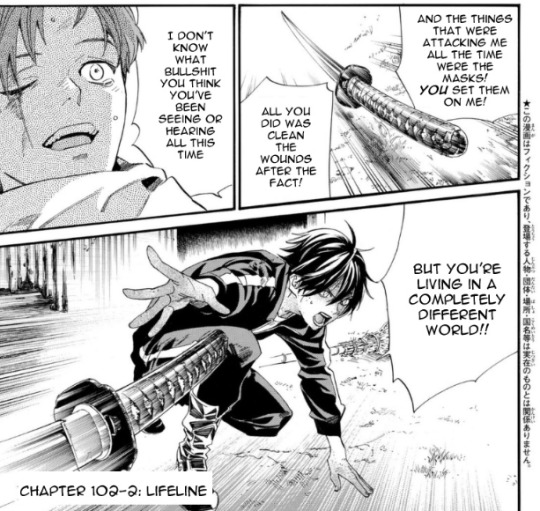
I usually read Noragami chapter raws in full when they first come out and what I found interesting here is what comes after Father quotes that: それがいい。今なら出来る sore ga ii. ima nara dekiru (roughly, “That’s just fine/good. I/You can do that, now.”) The thing about Japanese is that it often omits the subject of a sentence if the subject can be inferred from the context of the conversation, which can be... quite vague, sometimes, more so in manga format where it isn’t always clear what the speaker is referring to. 今なら出来るin very literal terms would be something like “now, can do.” It’s not specified who can do (something) here: you could insert “you” or “I” or even “we” - if we’re counting Mizuchi as a participant in the conversation - as the pronoun and it would still make sense.
I think fast-moon’s translation makes perfect sense too but personally, when I first read this page, I inferred the subject to be Yato (”You can do that, now”) rather than Father (”That’s something I can do now”) because Father was quoting Yato (the subject of the sentence, the one doing the saying, おまえは言ったな... omae wa itta na). If Father was referring to himself, I would rather think that he would have used オレ (ore) preceding the sentence, the masculine pronoun that Father uses to refer to himself.
In that sense, I took it to be something like “You say I’m living in a completely different world, well, now you can do that too”, as in - you can live in that world (that I live in), too. Definitely take it with a grain of salt because I certainly don’t have as much translation experience as fast-moon buuut considering Hiyori sees the memories of the past in that void, I think it’s a reasonable interpretation to entertain.
102 also gave us this flashback, after all.

So, what is Birthing a Nation and what can it do? And - perhaps more importantly - where did this ability come from? (The jury is still out on whether it’s an asspull ability or not, lol, but I am definitely intrigued by it.)
The only thing we know for certain is that it can create a space: it is that black, reflective void that Shiiho likens to a lake, which is expanding (insert domain expansion joke here). Hiyori sees it as a space that is underwater, where several scenes can be seen. They might be memories, as we see the sakura tree under which Yato met Tamanone, Father and co.’s old hut, and possibly their home in Tamagahara. The end chapter note describes it as an “enchanted world” ( 魅せる世界, miseru sekai)* that was created by Birthing a Nation.
* Side note: I thought the 魅せる in 魅せる世界 miseru sekai was an alternative/archaic kanji spelling of the modern 見せる (miseru, “to see/to be shown”), but it’s actually a special class suru verb 魅 する (misuru, “to charm/to bewitch/to enchant”). I do wonder if it’s meant to be homonym worldplay on both 魅せる世界 “enchanted world” and 見せる世界 “world that can be seen/is shown”, Adachitoka does love their worldplay.
Its Japanese name, Kuni-umi ( 国生み ,”the birth/creation of the land/nation”), also alludes to this ability to create. As fast-moon pointed out in the translation notes, it specifically refers to the creation myth of the Japanese archipelago by Izanami and Izanagi.**
After the formation, Heaven was above and Earth was still a drifting soft mush. The first five gods named Kotoamatsukami (別天津神, "Separate Heavenly Deities") were lone deities without sex and did not reproduce. Then came the Kamiyonanayo (神世七代, "The Seven Divine Generations"), consisting of two lone deities followed by five couples. The elder gods delegated the youngest couple Izanagi and Izanami to carry out their venerable mandate: to reach down from heaven and give solid form to the earth.
This they did with the use of a precious stone-covered spear named Ame-no-nuboko (天沼矛, "heavenly jewelled spear"), given to them by the elders. Standing over the Ame-no-ukihashi (天浮橋, "floating bridge of heaven"), they churned the chaotic mass with the spear. When drops of salty water fell from the tip, they formed into the first island, Onogoroshima. In forming this island, both gods came down from heaven, and spontaneously built a central support column called the Ame-no-mihashira (天御柱, "heavenly pillar") which upheld the "hall measuring eight fathoms" that the gods caused to appear afterwards.
- Kuniumi, Wikipedia
** According to Wikipedia, Kuniumi in reference to this myth is spelled 国産み instead of 国生み, which is how it’s spelled in Noragami. The kanji 産 seems to have stronger connections solely to the act of childbirth, among other things. While 生み can also mean “birth, giving birth”, it can also refer to the act of creation, “bringing into the world.”
I remarked (partly in jest) that Father has become undeniably “Izanagi-coded” buuuut in truth, he has always been partly “Izanagi-coded” in the sense that he seems to have been inspired by the mythos of Izanagi (an idea that @nyappytown helped me tap into with her brilliant breakdowns of Susanoo inspirations in Yato’s character). I touched on this briefly when I did my post on the origins of the mythical magatsuhi-no-kami 禍津日神 (once again Noragami’s spelling differs a bit, magatsukami 禍津神, even though clearly this concept was inspired by the myth). It warrants another mention because immediately following the Kuniumi came the Kamiumi 神産み (”the birth of the kami”), a period where many kami were born from Izanagi and Izanami’s union, then Izanami’s death, Kagutsuchi’s death, during Izanagi’s escape from Yomi, and, finally, during Izanagi’s purification following his return from Yomi.
I think a lot of the comparisons to the Izanagi mythos re: Father came from the fact that he calls himself “Father” (as in, the “father” of the gods, in a sense) and the parallels with his descent into Yomi (I think it’s fair to say that Father seeing Kaya’s likeness in Izanami can be compared to Izanagi descending into Yomi specifically to see Izanami, his deceased wife, on some level) and subsequent return from Yomi. Father returning from Yomi has certainly been talked about a lot but the immediate aftermath has not yet come up - I think it’s safe to bet that it will be drawing from Izanagi’s purification, the last part of the Kamiumi.
The TL;DR of the Izanagi purification story, as written on Izanagi’s Wikipedia page (complete with citations that I will not include here):
Izanagi, feeling contaminated by his visit to Yomi, went to "[the plain of] Awagihara (i.e. a plain covered with awagi) by the river-mouth of Tachibana in Himuka in [the island of] Tsukushi" and purified himself by bathing in the river; various deities came into existence as he stripped off his clothes and accouterments and immersed himself in the water. The three most important kami, the "Three Precious Children" (三貴子 mihashira no uzu no miko or sankishi) – the sun goddess Amaterasu Ōmikami, the moon deity Tsukuyomi-no-Mikoto, and the storm god Susanoo-no-Mikoto – were born when Izanagi washed his left eye, his right eye, and his nose, respectively.
(Note: As you can see, water plays a big theme in Shinto. The islands of Japan were born out of the sediment in the ocean, and here, it is an agent of purification by which one can clean themselves of ritual impurity, kegare 穢れ. That continues to be the case in modern day practices, which you can see at Shinto shrines, and in Noragami as well - clean water is used to purify blight caused by ayakashi.)
The Kamiumi Wikipedia page goes on to elaborate that Omaga-tsuhi (Magatsuhi-no-kami, just a slightly different variation of the name) was the second god born of the impurities that were stripped from Izanagi after he discarded his clothes, following his return from Yomi. According to Japanese Wiki Corpus, Magatsuhi-no-kami is a god of disasters.
I won’t rehash too much of what I said in “On Matagtsukami: A Few Noragami Thoughts” but one thought has got me thinking:
How exactly was Yato wished into existence by Father, from a single strong wish? Perhaps, just maybe, the thing that some people argued would make it implausible for Yato to have been born from Father’s wish - the fact that his return from Yomi rendered him no longer fully human - is the very thing that enabled it to happen in the first place? Could it have been from the purification process after returning from Yomi? Or maybe with the help of the Brush - not Father forcing another name on an already existing, reincarnated god, but by using the Brush as a catalyst for the manifestation of Father’s wish in some way, since Yato was born after Mizuchi had been named with the Brush?
Bear with me, here.
It was said a few chapters ago that the Brush has been “infused with Izanami’s spirit” - it has Izanami’s power in it, and that’s probably why it works and simply naming ayakashi with a mask and incantation does not. After all, ayakashi have “lost their spirit” and have “neither true names nor human forms” - they are simply vectors of negative energy and impurities.
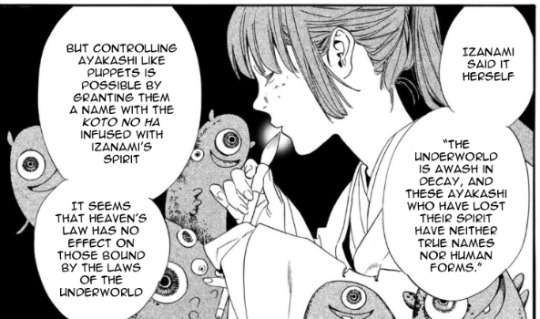
Side note: Just realized we got pretty much the same visual in this chapter. Not a coincidence by any stretch of the imagination.
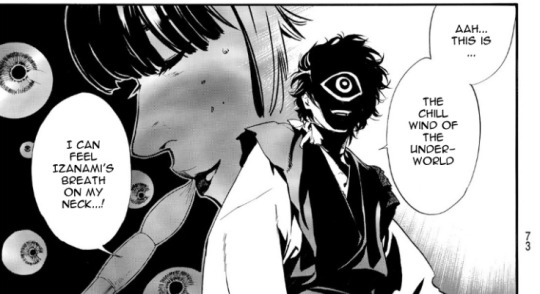
But Izanami helped create the islands of Japan, her power is (was?) “creation”, just as it is Izanagi’s. Her status as the “matron god” (国母たる神, koku botaru kami) of the country has even brought up in 103-2.

I suspect that Father had “infused” himself with the power within the Word by drawing the ayakshi eye on his face, giving him abilities similar to that of Izanami. We never really got an explanation of the powers we see her use in Yomi. Naming ayakashi and corrupted spirits is one thing... using such a power on a spirit akin to a deity might be entirely another. (Considering the fact that Izanami is sealed in Yomi and the whole “laws of the Underworld” we’ve gotten a few chapters ago, though, I can’t see this ending well for Father.)


(Note: The above panel of Izanami is from Chapter 36, titled 呪 縛 Jyuubaku, “Binding Curse/Spell.” It’s the chapter in which Izanami completely seals off Yomi to prevent Yato from escaping. Possibly the name of one of her abilities?
Also, I’ve always thought some of the patterns bear a striking resemblance to Jomon pottery.

From Prehistoric Japanese Pottery.)
Birthing a Nation being a reference to the creation of Japan would seem to confirm that, indeed, the Brush has powers of “creation” - Izanami’s powers. In tandem with the myth of the birth of many gods following Izanagi’s return from Yomi (and the established parallels with Father), I would not be surprised if Father had somehow used that power to create Yato, hence why just one man/deity/goryo was able to create a kami when it shouldn’t have been possible.
Considering that the last Brush was said to be weaker than the current one Father is using, I do think that another element was needed for a kami to be created. As to what that would be, I have no idea - this theory certainly has its holes, it’s not perfect, but I wouldn’t say it’s far-fetched, either. A lot of kami seem to be born from things like blood and random articles of clothing so maybe that’s on the table? ;P
But back to Birthing a Nation. So, it has created a space that looks like a reflective, watery void, bearing the same patterns that we see Izanami use in Yomi. Hiyori sees what seem like memories but... what is that space? What is actually in it?
I don’t think they necessarily have to be memories. Seeing as Father was specifically responding to “you’re living in a completely different world”/”just what world are you living in?”, I think it could be any number of things. Does Father want Yato to experience the world as he sees it (considering that Yato specifically said he doesn't know "what bullshit you think you've been seeing or hearing")? Is he sending him back to the past? Has it something to do with Father's or Yato's memories?
...Is he creating another alternative timeline altogether?
I guess that remains to be seen. But I think we are going to be seeing Father’s return from Yomi and Yato’s birth very soon!
47 notes
·
View notes
Text
Vocabulary junkyard
Just keeping track of all the interesting definitions that I come across:
(Will be updated regularly)
30/1/23
Solipsism (noun): a theory holding that the self can know nothing but its own modifications and that the self is the only existent thing / extreme egocentrism
Ostentatious (adjective): attracting or seeking to attract attention, admiration, or envy often by gaudiness or obviousness / overly elaborate or conspicuous / characterized by, fond of, or evincing ostentation
Diaphonization (noun): Diaphonization, also known as clearing and staining, is a staining technique used on animal specimens that first renders the body of the animal transparent by bathing it in trypsin, and then stains the bones and cartilage with various dyes, usually alizarin red and alcian blue
31/1/23
Streisand effect (pop-culture term): phenomenon in which an attempt to censor, hide, or otherwise draw attention away from something only serves to attract more attention to it
1/2/23
Caprice (noun): a sudden, impulsive, and seemingly unmotivated notion or action / a sudden and unaccountable change of mood or behaviour
Petulance (noun): the quality or state of being petulant; insolent or rude in speech or behaviour / childlishly sulky or bad-tempered
3/2/23
Egregious (adjective): outstandingly bad / shocking
Presumptuous (adjective): overstepping due bounds (as of propiety or courtesy) / failing to observe the limits of what is permitted or appropriate
22/3/23
Burgeoning (adjective): beginning to grow or increase rapidly; flourishing
Homogeneous (adjective): of the same or similar kind in nature / consisting of parts all of the same kind
Frenetic (adjective): fast and energetic in a rather wild and uncontrolled way / marked by a disordered or anxiety-driven activity
19/4/23
Austere (adjective): severe or strict in manner, attitude, or appearance / hacing an extremely plain and simple style or appearance; unadorned
Duning-Kruger effect (psychology): a cognitive bias whereby people wwith low ability, expertise, or experience regarding a certain type of task or area of knowledge tend to overestimate their ability or knowledge
“Ignorance more frequently begets confidence than does knowledge” - Charles Darwin
6/5/23
Jettisoned (verb): throw or drop something from an aircraft or ship / abandon or discard something or someone that is no longer wanted
Exaltation (noun): a feeling or state of intense happiness / the action of elevating someone in rank or power / the action of praising someone or something highly
Propensity (noun): an inclination or a natural tendency to behave in a particular way
26/5/23
Illusory truth effect (psychology): the tendency to believe false information to be correct after repeated exposure. This phenomenon was first identified in a 1977 study at Villanova University and Temple University
28/5/23
Divisionism (visual arts): a late 19th century painting tecehnique that involved using tiny adjacent dabs of primary colour to create the effect of light. The technique was inspired by optical theory and associated with neo-impressionist artists such as Georges Seurat
Credence (noun): belief in or ready acceptance of something as true / a small side table, shelf, or nich in a church for holding the elements of the Eucharist before they are consecrated
Vitriol (noun): bitterly crticism or malice / general chemical name compassing a class of chemical compound comprising sulfates of certain metals
Layman (noun): a non-ordained male member of a Church / a person without professional or specialized knowledge in a particular subject
17/6/23
Maelstrom (noun): a powerful whirlpool in the sea or a river / a situation or state of confused movement or violent turmoil
Litany (noun): a series of petitions for use in church services or processions, usually recited by the clergy and responded to in a recurring formula by the people / a tedious recital or reptitive series
Equanimity (noun): calmness and composure, especially in a difficult situation
Calamity (noun): an event causing great and often sudden damage or distress; a disaster
“Equanimity is calamity’s medicine” - Publilius Syrus
0 notes
Text

I posted 219 times in 2022
That's 219 more posts than 2021!
25 posts created (11%)
194 posts reblogged (89%)
Blogs I reblogged the most:
@adieupanache
@frenchwordsdaily
@aro-langblr
@fluencylevelfrench
I tagged 52 of my posts in 2022
#leo posts - 22 posts
#langblr - 20 posts
#languageblr - 13 posts
#french - 13 posts
#language learning - 13 posts
#francais - 12 posts
#french langblr - 12 posts
#resources - 10 posts
#journal - 6 posts
#get to know me challenge - 6 posts
Longest Tag: 88 characters
#j’ai cru que c’était une publicité pour une application de l’amour ou qq autre chose mdr
My Top Posts in 2022:
#5
bonjour!
i am leo, welcome to my blog!
currently, i am trying to learn french. im around B1 level and i am taking classes to get better :3
mi lengua nativa es español but i know english to a native level too
i have many languages of interest but my main focus right now is definitely french
future target languages -> LSQ, nahuatl, toki pona, german, arabic, korean, japanese
9 notes - Posted July 16, 2022
#4
Le passé récent
(english and spanish explanations below)
(explicaciones en inglés y español debajo)
Le passé récent est utilisé quand on veut parler de quelque chose qu'on a fait très récemment
Le format de ce conjugation es le prochain:
venir conjugué au présent + de + un verb infinitive
Par example: Je viens de manger avec mes amis.
Une activité pour vous:
Pour chacun des verbes suivants, formulez deux phrases au passé récent
regarder
voir
finir
achèter
passer
Mes phrases sont dessous du reste du post, si vous voulez comparer :3
English version
The passé récent (recent past) is used when someone wants to talk about something they did very recently.
The format of this conjugation is the following:
venir conjugué au présent + de + un verb infinitive
For example: Je viens de manger avec mes amis.
The English version of this sentence would be "I have just eaten with my friends."
An activity for anyone reading this:
For each of the following verbs, make two sentences using the passé récent:
regarder
voir
finir
achèter
passer
Versión en español
El passé récent (pasado reciente) se utiliza cuando queremos hablar de algo que acabamos de hacer.
See the full post
11 notes - Posted July 19, 2022
#3
ahora que estoy leyendo dracula, me puse a pensar cómo se escribiría mi acento fonéticamente, ya que bram stoker hace eso bastante seguido en su novela
mis amigos me dicen que sí tengo un acento regio marcado al hablar, y yo sé que a veces digo pa’ en vez de para, eso es algo que creo que es específico a mi acento. también está el decir ‘amonos en vez de vamonos o ‘tonces en vez de entonces. creo que el cambio más drástico sería algo como p’allá en vez de para allá, efectivamente ignorando tres letras. obviamente está también el cambio de decir pos en vez de pues, alguien una vez supo que yo era mexicano porque dije eso
sí veo por que mis amigos brasileños dicen que hablo muy rápido en español para ellos jajaja
20 notes - Posted October 4, 2022
#2
Comment écrire l’heure en français
(English version below)
(Versión en español debajo)
Pouvoir écrire l’heure correctement est très important pour bien se communiquer avec des autres personnes.
En français, on utilise surtout le format de 24h et pas le format de 12h avec AM/PM. Plus, au lieu d’utiliser le séparateur “:” entre l’heure et la minute, on utilise “h” car celui représente le mot “heure.”
Donc, des exemples d’heures qu’on pourrait voir sont:
0h00 (minuit)
9h15 (9:15 AM)
12h00 (midi)
18h20 (6:20 PM)
How to write the time in French
Being able to write the time correctly is very important to be able to communicate properly with other people.
In French, people tend to use the 24 hour format rather than the 12 hour AM/PM format. Also, they use “h,” representing the word “heure” (hour), between the hour and minute instead of “:”.
So, some examples of times that you might see are the following:
0h00 (midnight)
9h15 (9:15 AM)
12h00 (noon)
18h20 (6:20 PM)
Cómo escribir la hora en francés
Poder escribir la hora correctamente es importante para poder comunicarse bien con otras personas.
En francés, se suele usar el formato de 24 horas en vez del formato de 12 horas con AM/PM. Además, en vez de usar el separador “:” entre la hora y los minutos, se utilisa la letra “h”, que representa la palabra “heure” (hora).
Entonces, algunos ejemplos de horas que uno pudiera ver son:
0h00 (medianoche)
9h15 (9:15 AM)
12h00 (mediodía)
18h20 (6:20 PM)
20 notes - Posted November 15, 2022
My #1 post of 2022
some people say that wanting to learn toki pona is dumb but its like… you dont appreciate her??

soweli?
shes so shaped… how can you not love her
111 notes - Posted December 5, 2022
Get your Tumblr 2022 Year in Review →
1 note
·
View note
Text
Just out of curiosity, but what makes you guys decide to write in either past tense or present tense for your fics? I mean personally I always write in past tense because most books I’ve read are past tense, so it’s just what I’m used to, and what feels like an ‘official storytelling tense’ for me. But I know there are a huge amount of present tense fics out there, and I was wondering if fic authors who write in the present tense do it for a specific reason, or if it’s just preference or habit? I enjoy reading both, but I was just curious about why people choose to write in the tense that they do, and what makes them choose one tense over another!
#fan fiction#writing#fic#i've been meaning to ask but just kept forgetting#and the other day i was working with my grade 6 student who's from china and had to write a story for her class#and i always remind her to keep her verbs consistent so if she picks a tense for her story she has to stick with it#and i asked which tense she wanted it to be in and she was like 'oh definitely past'#which i thought was funny/neat that she already had such an adamant preference for fiction tenses lol and in her second language as well#but yeah i'd love to hear why people choose one tense over the other!
23 notes
·
View notes
Text
How to learn a language when you don’t know where to start:
General Plan:
Weeks 1 and 2: Purpose:
Learn the fundamentals sentence construction
Learn how to spell and count
Start building a phrase stockpile with basic greetings
The Alphabet
Numbers 1 - 100
Subject Pronouns
Common Greetings
Conjugate the Two Most Important Verbs: to be and to have
Basic Definite and Indefinite Articles
Weeks 3 and 4: Purpose:
Learn essential vocabulary for the day-to-day
Start conjugating regular verbs
Days of the Week and Months of the Year
How to tell the time
How to talk about the weather
Family Vocabulary
Present Tense Conjugations Verbs
Weeks 5 and 6: Purpose:
Warm up with the last of the day-to-day vocabulary
Add more complex types of sentences to your grammar
Colours
House vocabulary
How to ask questions
Present Tense Conjugations Verbs
Forming negatives
Weeks 7 and 8: Purpose:
Learn how to navigate basic situations in a region of your target language country
Finish memorising regular conjugation rules
Food Vocabulary and Ordering at Restaurants
Money and Shopping Phrases
Present Tense Conjugations Verbs
Weeks 9 and 10: Purpose:
Start constructing descriptive and more complex sentences
Adjectives
Reflective verbs
Places vocabulary
Weeks 11 and 12: Purpose:
Add more complex descriptions to your sentences with adverbs
Wrap up vocabulary essentials
Adverbs
Parts of the body and medical vocabulary
Tips for Learning a Foreign Language:
Learning Vocabulary:
What vocabulary should I be learning?
There are hundreds of thousands of words in every language, and the large majority of them won’t be immediately relevant to you when you’re starting out.Typically, the most frequent 3000 words make up 90% of the language that a native speaker uses on any given day. Instead try to learn the most useful words in a language, and then expand outwards from there according to your needs and interests.
Choose the words you want/need to learn.
Relate them to what you already know.
Review them until they’ve reached your long-term memory.
Record them so learning is never lost.
Use them in meaningful human conversation and communication.
How should I record the vocabulary?
Learners need to see and/or hear a new word of phrase 6 to 17 times before they really know a piece of vocabulary.
Keep a careful record of new vocabulary.
Record the vocabulary in a way that is helpful to you and will ensure that you will practice the vocabulary, e.g. flashcards.
Vocabulary should be organised so that words are easier to find, e.g. alphabetically or according to topic.
Ideally when noting vocabulary you should write down not only the meaning, but the grammatical class, and example in a sentence, and where needed information about structure.
How should I practice using the vocabulary?
Look, Say, Cover, Write and Check - Use this method for learning and remembering vocabulary. This method is really good for learning spellings.
Make flashcards. Write the vocabulary on the front with the definition and examples on the back.
Draw mind maps or make visual representations of the new vocabulary groups.
Stick labels or post it notes on corresponding objects, e.g when learning kitchen vocabulary you could label items in your house.
How often should I be practising vocabulary?
A valuable technique is ‘the principle of expanding rehearsal’. This means reviewing vocabulary shortly after first learning them then at increasingly longer intervals.
Ideally, words should be reviewed:
5-10 minutes later
24 hours later
One week later
1-2 months later
6 months later
Knowing a vocabulary item well enough to use it productively means knowing:
Its written and spoken forms (spelling and pronunciation).
Its grammatical category and other grammatical information
Related words and word families, e.g. adjective, adverb, verb, noun.
Common collocations (Words that often come before or after it).
Receptive Skills: Listening and Reading
Reading is probably one of the most effective ways of building vocabulary knowledge.
Listening is also important because it occupies a big chunk of the time we spend communicating.
Tips for reading in a foreign language:
Start basic and small. Children’s books are great practice for beginners. Don’t try to dive into a novel or newspaper too early, since it can be discouraging and time consuming if you have to look up every other word.
Read things you’ve already read in your native language. The fact that you at least know the gist of the story will help you to pick up context clues, learn new vocabulary and grammatical constructions.
Read books with their accompanying audio books. Reading a book while listening to the accompanying audio will improve your “ear training”. It will also help you to learn the pronunciation of words.
Tips for listening in a foreign language:
Watch films in your target language.
Read a book while also listening along to the audio book version.
Listen to the radio in your target language.
Watch videos online in your target language.
Activities to do to show that you’ve understood what you’ve been listening to:
Try drawing a picture of what was said.
Ask yourself some questions about it and try to answer them.
Provide a summary of what was said.
Suggest what might come next in the “story.”
Translate what was said into another language.
“Talk back” to the speaker to engage in imaginary conversation.
Productive Skills: Speaking and Writing
Tips for speaking in a foreign language:
If you can, try to speak the language every day either out loud to yourself or chat to another native speaker whether it is a colleague, a friend, a tutor or a language exchange partner.
Write a list of topics and think about what you could say about each one. First you could write out your thoughts and then read them out loud. Look up the words you don’t know. You could also come up with questions at the end to ask someone else.
A really good way to improve your own speaking is to listen to how native speakers talk and imitate their accent, their rhythm of speech and tone of voice. Watch how their lips move and pay attention to the stressed sounds. You could watch interviews on YouTube or online news websites and pause every so often to copy what you have just heard. You could even sing along to songs sung in the target language.
Walk around the house and describe what you say. Say what you like or dislike about the room or the furniture or the decor. Talk about what you want to change.This gets you to practise every day vocabulary.
Tips for writing in a foreign language:
Practice writing in your target language. Keep it simple to start with. Beginner vocabulary and grammar concepts are generally very descriptive and concrete.
Practice writing by hand. Here are some things you can write out by hand:
Diary entries
Shopping lists
Reminders
What could I write about?
Write about your day, an interesting event, how you're feeling, or what you're thinking.
Make up a conversation between two people.
Write a letter to a friend, yourself, or a celebrity. You don't need to send it; just writing it will be helpful.
Translate a text you've written in your native language into your foreign language.
Write a review or a book you've recently read or a film you've recently watched.
Write Facebook statuses, Tweets or Tumblr posts (whether you post them or not will be up to you).
Write a short story or poem.
Writing is one of the hardest things to do well as a non-native speaker of a language, because there’s no room to hide.
There are lots of ways to improve your writing ability, but they can be essentially boiled down to three key components:
Read a lot
Write a lot
Get your writing corrected
#langblr#language learning#studyblr#studying#quarantine#study tips#language tips#language learner#languages#spanish language#french language#langblog#spanish langblr#french langblr#studying languages#language lover#receptive skills#productive skills#reading#writing#listening#speaking#langblr tips#study inspiration#online studying#selftaught#vocabualry#my post#long post#language guide
28K notes
·
View notes
Text
My chinese knowledge is both much (to me who was once struggling to comprehend anything) and also so very very little (the reality of learning languages is there is Always more... in one's native language and all others studied)
This is just me rambling so feel free to ignore uvu alrighty let's get into it. So I learn with the goal of reading in my target languages (usually that's my main motivation initially). So over the years I've figured out, what works best for me is SRS or studying a list of 1000-2000 common words (or reading thru a textbook/taking a class which covers this much or part of it), reading through a grammar guide summary (not to memorize but just for an overview of what to be aware of and consider looking up more later when I see it in practice and get confused). And optionally, looking up the basic ways to say someone present-tense verb, past tense verb, future tense verse, to be and to have verb conjugations. Because these particular features are helpful to know if I want to try chatting/writing with people later.
Sometimes I use different materials to cover the stuff above, but I'm usually doing the stuff above. For example for french: I learned basic past, present, future, basic conjugations from a French class and pronunciation, 1000 common words from a word list, and read a grammar guide summary my first few months. Then I read 300 pages of Le Francais Par Le Methode Nature which helped a ton (and still helps) for learning through context. About 5-6 months in I started reading articles, nonfiction, Wikipedia, graded readers, looking up a handful of words in a translator per page. About a year in I could forgo the word look up and just pick up words from context, about 1.5 years in I could move from graded readers to novels, and at 2 years I stopped studying as far as reading goes - by then I could pick up anything I wanted to read in French and it was doable. I noticed at 2.5 years in etc that reading got easier/felt faster and like less effort, noticed stuff id only managed to follow the main ideas or before i could now follow Most Details too. But after 2 years reading was like English in that I could improve just by doing it more, and it was good enough to do what I wanted. So after that I studied other things in French every so often (pronunciation, listening, grammar a few times for productions sake and I'll definitely need to AGAIN at some point).
Chinese study went similarly. Surprisingly to me, progress reading wise actually followed the same timeline. I'm maybe 2-2.5 years into studying now and I'm probably at a point I could abandon all word lookup, learn only from context (I did this at 1 year in French but cognates helped... in chinese I still had more hanzi to learn 1 year in), and get by knowing at Least the main idea of most stuff I want to read. So now I mainly just read to improve reading, like with English and French. Like French, my main focus when I study now is pronunciation, LISTENING (I want to be able to follow audiobooks better), reading Speed, and one day eventually improving production skills.
My point with all this is like. Well 1. I learn by doing mostly, and that activity I do is Read (also watch shows and listen and browse the internet but reading is probably over 50%). 2. I have a super high tolerance for ambiguity. I think the higher your tolerance for ambiguity, the "easier"/more tolerable you will find learning by doing.
So with extensive reading (reading extensively with no word lookup and picking things up from context), most people comfortably do it when they comprehend 98%. That is like me reading a sewing article - i don't know all the words, but I know enough words to figure out some sewing terms from context. Think of any novel you read in school where you picked up the word melancholy or desolate from context of a scene. Graded readers, for language learners, are designed to hit as close to that comfortable spot as possible.
People can actually still learn some new words/grammar from context clues at lower comprehension levels. 95% comprehension is comfortable enough for a large portion of people, and I've seen studies where even down to 90% comprehension some readers can tolerate the ambiguity and still have enough comprehension to learn some new things from context. They may not necessarily be comfortable at 90% comprehension but some people find it tolerable. (I think the lower limit may have been 80% on some study but it's not comfortable generally for most people). Usually 90% comprehension materials are used for intensive reading, using short texts where people look up a TON of words. Usually we read 95% comprehensible or more when we are reading "comfortably" (think an adult reading in their native language a reading material at their reading level, although not necessarily in a topic they're super familiar with - so me reading about some law proceeding with a lot of technical jargon).
Well as a language learner, at least me when i learn 2000 words, you don't start off with 95%+ comprehensible native material. You have some graded readers (which may be 95%+ comprehensible) Then you have materials for native speakers which are mostly less than 95% comprehensible to you. Because you just don't know enough words for reading native material texts yet! You can solve this a few ways: 1. Read INTENSIVELY, looking up words you don't know often, trying to learn them asap, so you'll improve your vocabulary enough to start to find SOME material 95% comprehensible. 2. Do a middle ground where you only look up 1-20 words per page (whatever is tolerable to you) aka enough key words to grasp the main idea of what is going on. It's intensive reading but you cover more pages faster, and since you don't look every word up you will have some chances to guess meanings based on context. I mostly do this one, but I also do periods of Intensive Reading especially when I want to improve my vocabulary faster (aka quickly push up my reading level significantly). Now with this method 2, I find it's easier if you pick relatively simpler writing to start so that you can AT LEAST follow the main idea with the aid of your modest word lookups. If you can't follow the main idea, even with the help of 1-20 word lookups on a given page, that material is too difficult to learn from. Likewise, with option 1 if you are intensively reading something, looking up Every unknown word, and STILL can't understand the main idea - that material is too difficult for you to use, find a lower reading level material. 3. Read extensively only. This one is hardest, as you will first be trying to find ANYTHING that you can at least grasp the main idea of. For me in japanesr, after 2 years I had to study more SRS flashcards, learn chinese for a year, THEN I finally found i could read some manga and follow the main idea without a dictionary. With french, this would have actually been quite easily achievable if i simply read the graded reader Le Francais Par Le Methode Nature all the way to the end, then switched to French translations of simpler novels I'd read before in English (aka lower level reading material I had prior context for to help me guess meaning of unknowns).
The flip side of option 3? As you learn more, it becomes the "laziest" option in the sense it requires no tools, no pausing to the reading flow. It fries your brain the most, especially at first, because you're completely relying on yourself to figure stuff out. But if like me you hate flashcards/SRS/drills, then making option 3 feasible asap is ideal. So I try to get to option 3 quickly, and switch to the other two ways depending on if I think it will help (option 1 intensive reading boosts vocabulary FAST so it's a good boost to help increase reading level or do with a first chapter of a book to quickly learn all the authors particular common words, option 2 you get detail clarified whenever you want and make relatively speedy progress but without the constant stopping of every-word-lookup-intensive-reading. I do option 2 and 3 the most, and only usually do option 1 when I notice a huge weak point in vocabulary and am trying to fix it quick).
So, how to you get to option 2 or 3 asap, if intensive reading and looking up Every Unknown word burns you out/bores you/demotivates you etc? Consider if you can become more tolerant with ambiguity! If you can accept that it's okay if you don't grasp every detail - you might not know if the floor is green or black, if there's a ball or sword in his hand, bur you can tell X is in a room and sad and holding an object he plans to use against someone. Can you practice accepting that level of ambiguity? If so, I recommend trying to practice accepting ambiguity asap. If you are a new learner, do it 3 months in, 5 months into study, hell do it 1 month in (even though it feels completely brain frying to try to understand ANY bit of a paragraph in month 1). Just try to watch a 2 minute chinese youtube video, 5 minutes of a slice of life cdrama, try to read 1 paragraph of a cnovel you've already read the translation of in English. Try to read a page of a graded reader before you are at its level. It's okay to fail!! Try regularly, and be okay with failing, with not understanding. Feel the brain fry and give up when it's too much. But you will discover that what in month 1 you only recognized 四 and 是, in month 5 you recognize 是光明路四号 as an address, as a clause you know all the hanzi in. You will discover that the show you watched 10 minutes of in month 5 just barely grasping the opening was a robbery, in month 8 you can tolerate watching 20 minutes and realize it's a robbery of jewelry and a WATCH, and a guy catching them in the act! You notice very quickly how much progress you ARE making. It's really cool to see that progress! And as you kept trying to engage with content, you built up your tolerance for ambiguity. You will NEVER understand as little as you did in Month 1 or 3 or 5 again. Unless you start a new language- but now you know what that stage feels like and what progress increments to expect. By the time you get to month 8 and try to read a simple comedy manhua strip? You are brave and try immediately, because you were trying to read full on NOVEL paragraphs since month 3, subtitles since month 5, and these are just some simple everyday phrases with pictures to give you enough context that you barely even feel brain fried. Then it's month 10, and you don't even feel it's extra effort to engage with challenging stuff. It's just a bit slower going, since it takes you more time to comprehend the main idea enough to continue.
What I'm saying is, the more you build up that tolerance for ambiguity, then later when it IS time to read, watch, listen etc you have PRACTICED part of the task. The part of "tolerating the ambiguity" and managing to apply regular reading strategies to material. Some people wait til they learn 5000 words to start reading in chinese. If they really didn't read anything before, then they haven't practiced word parsing, recognition of grammar patterns, identifying key information, guessing from context clues, or the actual act of simply Trying to read content which is likely less than 95% comprehensible to you. So it feels HARD, even though based on their vocabulary it should not be as hard as it was for me at 2000 words. But they still have to catch upon the practice of just practicing reading the Skill, regardless of vocabulary/grammar knowledge.
If you can practice tolerating some ambiguity, you can see your understanding improve as you learn more, can practice skills as you go, and will find it less draining when you do have to get through the inevitable slog of Under 95% comprehension as you work as a language learner until you finally start getting to the point of target language materials being more comfortably comprehensible
#rant#reading#i read sokeone on reddit mention they learned 13000 portugeuse words and#cant read any books or listen to conversations#i can only assume??? they learned through SRS or memorizing im guessing???#because even at 1000 words i could follow basic daily life chinese one on onr conversations#and i probably only know maybe 4000-6000 words comfortably Max#and can read a LOT of stuff enough to follow the main idea or even#understand as much as if it were english.#so i can onky assume the guy jusr NEVER practiced reading much or comversing#like... i feel if he just went OKAY and read 1000 pages. or had 100 hours of convos#he would Get way betterrr since he has the vocab just not the skill of Practice#but yeah. i think if u do practice early and regulalry. the entire activity is less daunting later and only gets easier
17 notes
·
View notes